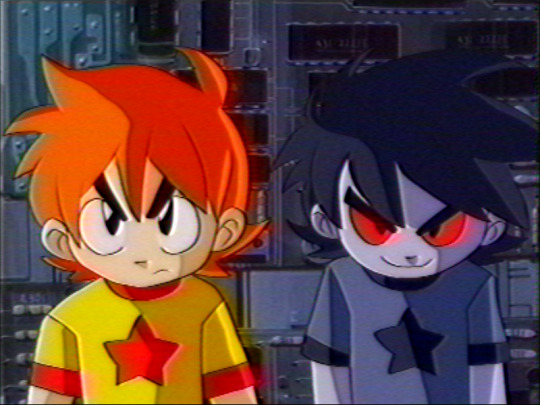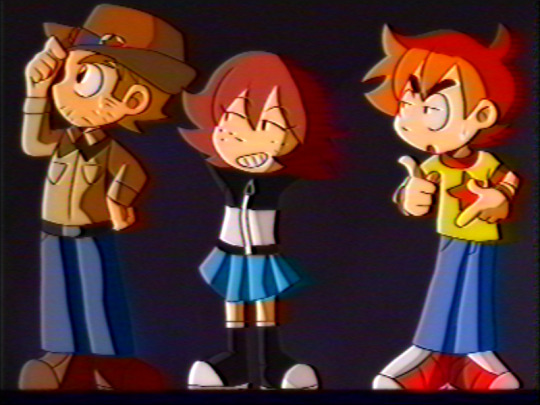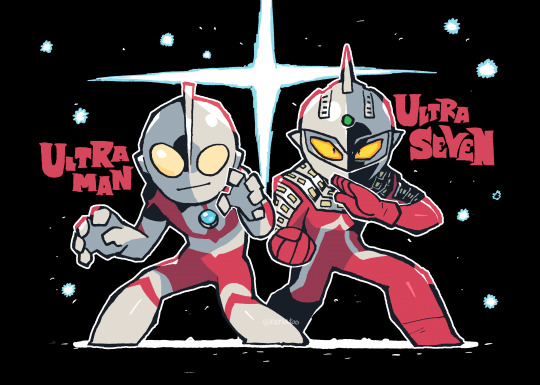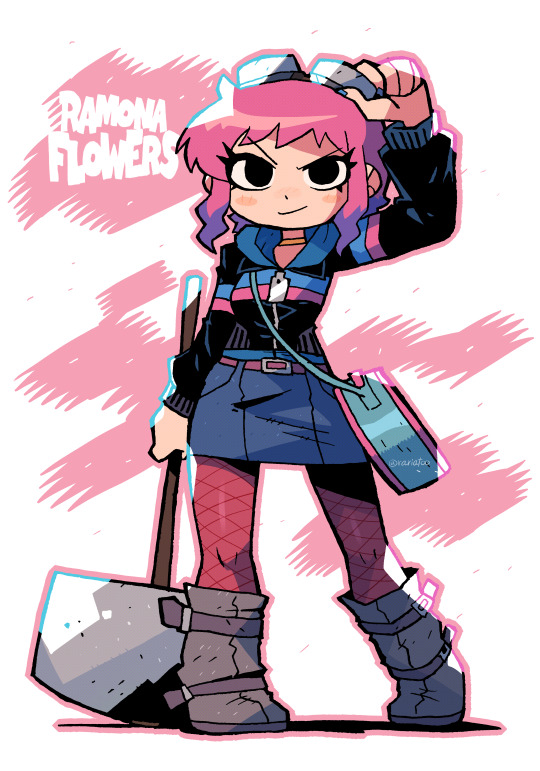Text
there is a dashboard unfucker alternative!!
@ everybody looking at the dashboard unfucker tag right now desperately looking for help because it suddenly stopped working. @pixiel's pinned post has a userstyle they developed that also reverts the dash back to the old style!! go get it now!!
7K notes
·
View notes
Text
I want to talk about that new Fallout TV show and the broader implications of the series as a whole. But the truth is, I don't even know where to start with it, and it doesn't seem worth the energy to jump into a full review. Tons of other people have already expressed similar feelings towards the same issues I have, and in a much more eloquent fashion, with more to follow, I'm sure.
For what it's worth, I do think that the show has loads of highlights. It embodies a good contrast between the cynical harshness of the world and the bright spots striving to make things better… at least to a point. Walton Goggins' Ghoul is perhaps the standout character and performance of the show as just the incredible bastard you love to hate, contrasting wonderfully against the rest of the cast. And you'll never get me to not think Matt Berry as a Mr. Gutsy is perfect casting.
But for all the good, the thing that gets me the most is the implications for the series as a whole, and what the waste destroying the NCR is. I'm sure someone was patting themselves on the back thinking it was some dramatic shake up. But it's not. It's a return to a familiar status quo. It feels like a move made so that going forward they never have to deal with a faction expanding and transforming the wasteland. The games can maintain a safe familiarity with the series' locales of small towns, abandoned buildings, and houses full of holes regardless of how much material is present. It's an admission of creative bankruptcy.
You could build an entire premise around the world changing, that scrounging up junk and relying on the remnants of the old world is slowly fading out. Where would such a shift leave the typical protagonist? Or, more precisely, how would the player approach and handle a world like that? Those are themes not dissimilar to those lightly touched upon in NV or, to use another series with more overt parallels, the taming of the west in Red Dead Redemption.
But that's not what the creative team wants, it seems. Fallout, like so many other franchises, wants familiarity to a fault. They want to inexplicably tie everything together; explain every intruding mystery; obsessed with continuity, but not enough to reference a proper series bible containing important dates to avoid story conflicts.
It's a focus so narrow and short sighted for such an expansive world of possibilities.
And the worst thing is I shouldn't be thinking about any of this shit. The show didn't have to be in continuity with the games, it didn't have to be "canon." I should be able to view the show as its own thing. I should look at stuff like the reveal of who started the great war and go "Well that's stupid and misses the point entirely, but at least it's just a spin off." But no, we just have to explain it, we can't let the ambiguity be the point, the point that the world was run by nationalist psychopaths who were all at fault. We have to undermine that with a scapegoat.
God I hate this modern media cesspit.
#Fallout#spoilers#I am so tired#obsessed with the old world#never expanding beyond it#having a notable yet limited impact across the wasteland#only to prevent change#No wonder they love the BoS so much
1 note
·
View note
Text
It's easy to jump to the conclusion that the NCR and New Vegas got destroyed in the series purely out of spite, because Bethesda is coping and seething that people like FNV more than any of their Fallouts. I'm also leaning towards that interpretation myself, although I'm not ready to attribute that specific intention to Bethesda just yet.
A much more charitable, but also more likely interpretation is this: Bethesda has a very superficial understanding of Fallout, and they're incapable of going in any new and interesting direction with it. And that's why they destroyed the NCR and New Vegas, because they represented humanity rebuilding and looking towards the future (albeit still with heavy doses of old world nostalgia, but FNV has already said plenty on the topic). Their continued existence in canon forces Bethesda to think about the future of the setting, when all they want to do is sit in their postapocalyptic sandbox that hasn't been cleaned up in 200 years and wank about the BOS, Vault-Tec, and 1950s American aesthetics. So they had to go.
Well, whichever one it is, it's clear that Bethesda has absolutely zero respect for the work of Obsidian/Black Isle. Or the Fallout setting in general, for that matter.
1K notes
·
View notes
Text
Adapting a movie into a pinball machine is a surprisingly difficult task. But the Princess bride pinball machine does it really well!
7K notes
·
View notes
Text
Review: The Bullet Train (1975) AKA Shinkansen Daibakuha.
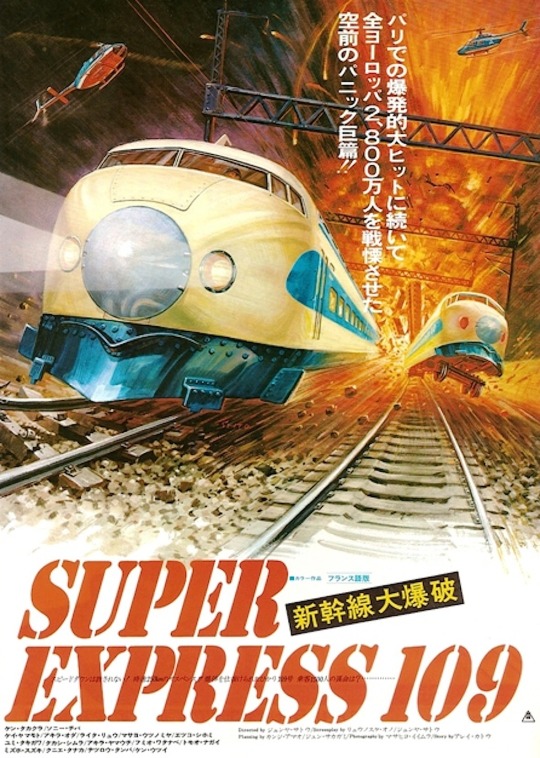
I went back and forth on if I wanted to do this as a bluesky post or a review. I tend to prefer only using tumblr for longer more detailed reviews like Ultra Seven, Black Sun, and Minus One.
But this ended up longer than 300 characters so… here we are.
The basic premise is a train gets wired with a bomb and if the train dips below 80kmph it'll go off. Guy makes demands, cops try to figure out who/how many are involved, things continue to unfold from there. Sound familiar?
Bullet Train is a curious watch in the modern era, mainly in how clichéd it comes off. I don't mean that as an insult, merely an observation. In much the same way Whale's Frankenstein popularized and even originated many tropes of the mad scientist archetype, Bullet Train will be familiar thanks to all the various parodies and homages over the years, even if through more indirect ones i.e. parodies of "Speed." The premise, various plot points and twists; they're all likely to be things you've seen referenced, if not done in other thrillers. That's not a deal breaker per se, but chances are you're going to know some if not most of the twists and contrivances sprung upon the audience due to that pop culture osmosis. You can read a synopsis and immediately have a surface level idea of the film.
This leaves The Bullet Train with a bit of an uphill battle when there are so many others that have done similar things. But I think with the right mindset and framing, there's plenty of merits to the film today.
The most obvious of course is the astonishing effects. I was about 40ish minutes into the film wondering as what point they would make more prominent use of the miniatures. There were clearly some used for an explosion scene involving a steam engine, and I was aware there had been a massive 80 foot long model built. But I hadn't realized how much footage was the scale model, and only occasionally inter-cut with wide shots of a real train. Even today the scale stuff looks incredible. The composites and rear projection on the other hand… yeah, they're rough, but that's expected.
The special effects were handled by Shozo Konishi; former TsuPro and Ultraman/Seven designer, Toru Narita; and Gunji Seisakusho. Narita is of course the most well know of the group, but it was Konishi who I see credited for acquiring one of the most advanced pieces of equipment at the time, a snorkel camera, allowing for very up close shots of the models. Star Wars would more famously make use of this 2 years later.
The other big draw is that the film is directed by Junya Sato. He had been doing films at Toei since the early 60s, and in the 70s he started to get bigger pictures, notably 1973's Golgo 13. But it was here when Sato truly entered Block Buster territory and would open up opportunities like The Go Masters and Silk Road.
Sato wrote the screenplay along with Ryūnosuke Ono, who you may know as one of the writers on the Crying Freeman OVA series. The result is something that even today feels a bit more unique than you might expect given all the other familiarizes.
One thing that might come as a surprise is that unlike many films following in the same wheelhouse, we don't actually spend all that much time on the train. It's hard to knock them for that given the locked in nature of a rail. Outside a sequence about needing to slow the train down and just missing another train during a rail switch, they kinda spend most of the train's dramatic bits in the first 45 minutes, at least until the last quarter. There are occasional cuts to passengers getting more restless, and the most un-pregnant woman I've ever seen going into labor. But there's little that threatens the speed of the train, which is the far more exciting element. In fact, they actually use one twice, that being the brakes engaging if an external door is opened. You're simply more limited than say a bus in terms of what can stop the movement, so the Train is used as more of a bookend set piece with sporadic check ins.
Instead, the film is primarily a procedural drama about the police solving the case and learning details about the antagonists. We also have a lot of conflict with The National Railway in how disastrous the Police operations are throughout, as well as internal conflict regarding the safety of the passengers vs. cutting their losses. Sophisticated might be too strong a word given the film is still an Action Thriller full of contrivances, but it's certainly less schlocky than other films within the same genre. Think of something more than Airport, but less than The Taking of Pelham 1 2 3. Bullet Train wants to have nuance and a tiny bit of social critiquing.
This is most true with our primary antagonist, Tetsuo Okita (Ken Takakura) who is by far the best part of the movie. It's never tiring seeing him plan, adapt, and escape multiple times throughout the film. The script treats the character incredibly sympathetically, to the point where you're kinda rooting for him. Part of that is how great Ken Takakura is in the role. Ironically outside Japan the film gets hailed as a Sonny Chiba movie, it even appeared in a compilation by BCI Eclipse. Chiba's great as always and he has a starring role, but make no mistake, Takakura is top billed for a reason. He brings a lot of complexity to Okita, his experience playing a wide range of Yakuza no doubt being a great boon to that end.
Aside from Takakura's performance, there are some elements delving into Japan's economic and environmental disasters of the 70s, the exploitation of rural areas, and allusions to the Zengakuren (which Okita is implied to have been affiliated.) Some of that is likely to missed given the lack of relevance nowadays, but for those aware of the movements and political turmoil of the mid 60s followed by the mid 70s burnout, I think you'll have a better appreciation for what the film is doing with Okita's character.
Conversely, where the film feels most antiquated in a detrimental sense is the heavy reliance on flashbacks and narration to fill in character details. The problem isn't even so much the flashbacks on a base level, but sometimes their placement and their execution feels disconnected from the rest of the film, if not dated even at the time. Rather than appreciating the nuance it's giving to our antagonists and their plight, I'm thinking about how weird the pacing is, how Okita reminiscing about his comrades often lacks the emotional impact it's looking for by just a tiny bit.
It wasn't unusual in this era for films made in Japan to be finished just three-four days before release, so it wouldn't shock me if this was a compromise.
That being said… I was more invested in these characters than the last movie I watched. Which is kinda depressing, but makes sense the more I think about it.
Something I'm more down on is the run time. The JPN cut of The Bullet Train is surprisingly long, really fucking long. Two and half hours. That's longer than The Shining.
By the hour and fifty minute mark, I was starting to notice. If it was 2 hrs. even, maybe 2:15, I think it'd be easier to swallow. For what it's worth, it's hard to imagine the film without its many methodical shots of Okita running through his tasks… but they probably could've shaved a bit off. I've heard there was an even longer 2:40 cut just before release, and if that's true, it's impressive they were able to cut a good 10 minutes out.
All the same, the run time does make it slightly difficult to recommend to just anyone, even Toku fans. I mean this is barely under the umbrella of what I typically cover here.
There's plenty of reasons to still watch it of course: The incredible cast, stunning special effects, and being a notable entry in a directors career-- run time be damned. If you're in the right mind set and have an interest in branching outside the typical Kaiju/Kyodai/Kaizo Ningen fare, then I highly suggest it. Maybe even look into the Sanrizuka Struggle to help contextualize the film. For everyone else, the film might come off as a victim of its own formula being so well known and done to death as to instill contempt, not helped by being a tad long in the tooth. But I'd still give it a fair shot if the opportunity arises.
A word of warning, the film is streaming on Tubi, but unfortunately they only have the dubbed version and it looks like garbage. It's not just a bad transfer, it's pixelated as shit. I'm not convinced they didn't badly rip a DVD or possibly a Youtube vid and just shove it on there, which they have done before. Although this one is really weird because it has a Shoreline Entertainment logo, and I can't find any info on them ever being a distributor for any release.
All this skeeviness is actually why this is yet another review free of screen grabs, as I watched the very nice Bluray from Discotek and can't rip those.

Tubi also made a shitty Al poster, but I repeat myself.
Check out the mysterious third rail, the dropping of "The" from the title, "Sony" Chiba, and the completely wrong train that isn't even a Shinkansen. How embarrassing. Why didn't they just use an official Poster? Unless of course they're not supposed to have it and think Toei might notice.
That place is worse than Kissasian while pretending to be legit, I swear.

Speaking of posters, I want to point out the Bluray by Discotek, which brilliantly uses the second release poster "Super Express 109" as the slip cover, and the original "Shinkansen Big Explosion" poster for the case. Love when releases do that.
Sadly, committing to a purchase is your best bet if you simply want to check out the film, at least until Mubi or some other niche service picks it up. You can't even rent it digitally. But it is a damn nice release with both versions of the film in gorgeous 2k, new subs, plus a 24 minute interview with Sato.
For the UK, Eureka Entertainment did a release with the same transfer and a ton more special features including commentary and several more interviews. So get out there and check out some classic Japanese thriller.
Hopefully you enjoyed taking a look at something different as much as I did. Doing these smaller quicker reviews is nice, and I'm going to see if I can get more done while still doing the deep dives. I've got a few things still in the works, so we'll see what next time brings. Might even do another book review.
As always, you can find me on BlueSky and my Ko-Fi here.
#tokusatsu#review#toei#Shinkansen#bullet train#sonny chiba#ken takakura#Ken Utsui#Junya Sato#Super Express#discotek media
2 notes
·
View notes
Text

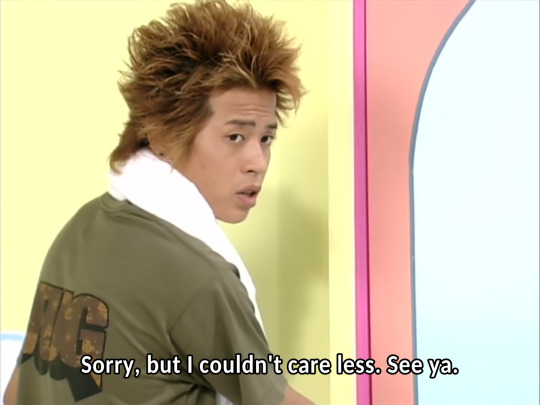
despite Kamen Rider's very different direction in the 2000s than in the 70s and 80s, it still continued to impart important lessons onto its young viewers; such as how to properly respond to powerscaling debates
784 notes
·
View notes
Text
Godzilla Minus One Review: Conflicting emotions for a solid entry.
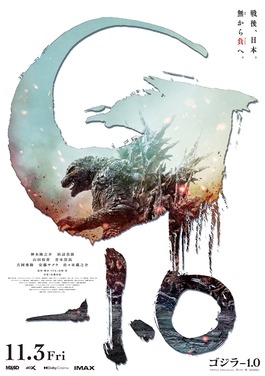
Oh boy, I can't wait to see the reaction this one gets.
This is one I was originally going to wait on reviewing when it hit Home video so I could have a fresher experience and do a more thorough covering of all that I wanted, not to mention screen grabs. I usually give much shorter reviews on theatrical release, but this one it didn't feel right to do that with.
I did however see it more recently, so I figured it was finally time to gather my thoughts and finish this up.
If you want my non-spoiler thoughts, I think Minus One was a great time and one of the better Godzilla films. It is remarkably well made, with a solid structure that puts much higher budget films to shame with what it accomplishes.
However I also don't believe the film takes advantage of its setting to properly explore some of complex themes and elements, nor do I believe it to be as deep as many critics have lauded. There are great emotional segments that work to ground the grandiose dread incurred by Godzilla. But I found the social commentary aspects rudimentary and entry level, even afraid to get truly mean, which I can only chalk up to nostalgic admiration for the era.
Now, if you wanna get more into my thoughts, hit the jump.
We follow Kōichi Shikishima (Ryunosuke Kamiki), a failed Kamikaze pilot who, near the end of the war, deferred to Odo Island rather than carry out his duty. There, his mortal fear results in the death of multiple other men when he is unable to take a shot at a (pre-mutated) creature the natives call Godzilla, with the only other survivor, technician Sōsaku Tachibana (Munetaka Aoki) blaming him for their needless deaths.
Riddled with survivors guilt and PTSD, Shikishima's life doesn't get any easier upon returning the burned out Tokyo, where he finds his home and family were destroyed in the fire bombing.
A series of circumstances soon brings him together with Noriko Ōishi (Minami Hamabe) and the baby she rescued during the bombings, Akiko (Sae Nagatani, as a toddler), the two are taken in by Shikishima, although more so on Ōishi's choice than Shikishima's.
Over the course of a couple of years, Shikishima manages to build something out of the rubble for himself, gaining employment with the Government as a Mine Sweeper aboard the Shinsei Maru. Here we're introduced to the rest of our supporting cast: Kenji "Doc" Noda (Hidetaka Yoshioka) a former Naval weapons developer; Capt. Yōji Akitsu (Kuranosuke Sasaki); and Shirō "Kid" Mizushima (Yuki Yamada) the only member not to see military service.
But soon the consequence of the US' Operations Crossroads test become apparent when the USS Redfish is sunk after pursuing an unidentified creature.
Due to various geopolitical reasons, the US refuses to get anymore involved. Douglas MacArthur releases several Battleships back to the Japanese Government, who themselves remain coy to the public about the reality of the situation. The Minesweeper crew are sent near the Ogasawara to stall until the heavy Cruiser Tako makes its voyage back from Singapore. It's here where Shikishima realizes what the monster is.
Obviously, a glorified tugboat is less than ideal to go up against Godzilla, but one of two mines acquired for the mission manages to lodge into Godzilla's mouth, which upon exploding takes a chunk of its skull out, temporarily killing Godzilla before immediately regenerating.
The crew are saved by the arrival of the Tako, which manages to knock Godzilla down, but it has less success than the mine; ultimately succumbing to Godzilla's Atomic Ray, but allowing the Maru to escape.
Days later, Godzilla breaks through Tokyo bay and into Ginza, laying waste to the district and attacking a train Ōishi is upon, who barely escapes. Shikishima rushes to the area and reunites with Ōishi, just as tanks engage with Godzilla, causing a retaliation with Atomic breath. Ōishi pushes Shikishima in an alley as she and other bystanders are swept up in the atomic winds, leaving Shikishima once again a lone survivor, as black rain pours down.
After Ōishi's funeral, Noda informs Shikishima of a civilian led plan to kill Godzilla, mostly formed with former naval veterans.
The plan is one of the more ingenious of the series. Two naval vessels will carry a line of Freon gas containers to entrap Godzilla over the Sagami Trough. The Freon will lower buoyancy and sink Godzilla 1,500m+ deep, presumably crushing it under the pressure. As a plan B, inflation devices will be deployed to induce rapid decompression.
Shikishima proposes getting a hold of a fighter plane to help lure Godzilla, although his actual intentions are making use of a kamikaze attack right into the mouth as a plan C. However all planes were decommissioned after the war. The one exception Noda finds being a prototype Kyushu J7W Shinden in massive disrepair. Thus, Shikishima begins the arduous task of specifically tracking down Tachibana, getting a black-eye for his trouble. Still, Tachibana arrives nonetheless and gets to work on the aircraft, while Shikishima prepares to leave Akiko in the care of his neighbor.
Things do not go according to Plan. While Godzilla sinks, it has no adverse effect. Plan B in enacted, but at 800 meters Godzilla stops ascending, having torn through the inflation devices. The ships aren't strong enough to pull Godzilla manually, but thankfully help arrives in the form of Mizushima and a fleet of tug boats. Together they manage to force Godzilla to the surface, badly damaged, but not enough. The Kaiju begins charging an atomic assault when Shikishima speeds in, flying directly into the mouth, exploding the head. The Atomic charge, with no where to go, tears through Godzilla's body, destroying it.
In the air, Shikishima descends from a parachute, thanks to Tachibana installing an ejection seat and encouraging him to let go and live.
Upon returning to land, Shikishima learns of Ōishi's survival and reunites with her badly bandaged, but alive and surprisingly intact self. Tearfully hugging, as a mysterious black mark spreads across her neck.
Deep in the ocean, Godzilla's remains sink further down, and begin regenerating.
We will be talking about the story elements here in a bit, but first I wanna front-load this with more praise before tackling that beast.
First off, a lot of attention has been given towards the CG, something which at the time of this writing has garnered an Oscar. A common clickbait buzz article around the film is "Better than Hollywood." In spite if that gaudy terminology, it's not something I disagree with. Some of the vehicle models are rougher and honestly not much different than what was seen in Shin. But Godzilla and the water are incredible. In fact, Yamazaki was so enamored with the fidelity that he rewrote the climax to be in the ocean, a choice I fully agree with. Although I am curious what the original entailed.
But while the CG quality is quite literally Oscar worthy, I think it's worth examining that it's not just a matter of graphics, but presentation. Takashi Yamazaki is above all else a talented director who knows how to make a scene exciting, capable of envisioning the finished product and what is needed every step of the way.
This is by far the greatest strength of the film. Almost every scene is approached asking how to best showcase it, which is accomplished in flying colors.
Suffice to say, every instance with Godzilla is harrowing and breathtaking, having quite possibly the scariest moments in the franchises 70+ year history. The attack on Ginza is largely filled with recreations from '54, but they are incredibly well done, and the original bits are worthy of the upmost praise; I cannot stress how truly great the boat chase is. Not only is it one of the best moments of the film, but it's also a demonstration of Yamazaki incorporating influences in a more original and less derivative manner compared to some previous efforts.
That said, for long time fans there are a plethora of visual nods to past material. From Gojirasaurus, to the Atomic build up in '14, a foggy blue atomic haze like in '54 and '62, Godzilla's eventual demise is reminiscent of GMK, even the model lacks muscle simulation to make it stiffer and more suit like. There are also numerous other details, my favorite of which is that Godzilla's Atomic ray causes self inflicted damage, and you will always see Godzilla's mouth healing afterwards, particularly the left side. Little touches like that go a long way for me.
Likewise, the score is impeccable. Akira Ifukube's legendary Godzilla March returns, arranged by Naoki Satō along with a few tracks from King Kong vs. Godzilla and Mothra vs. Godzilla as a new Suite. The theme is not over used, only appearing twice maybe three times in the film, plus a pre-credits scene, all very appropriate usages. Meanwhile, Naoki Satō's original score is a wonderful mixture of understated-- even atmospheric pieces, and a grandiose haunting apocalyptic orchestra. He utilizes these long drones that invoke naval horns, prop aircraft, and air-raid sirens that blend into each other. What might sound like a siren slowly builds, becoming more prolonged and pitched until it's suddenly an aircraft in a nose dive. Really spectacular stuff.
By far the stand out pieces of the Score are "Divine" and "Promise" (A leitmotif of the former) You likely heard these in the trailers, and with good reason. They are a befitting crescendo to Godzilla's rein of biblical destruction, ones that I have listened to repeatedly.
But while I do have a lot of praise for the audio visual aspects, we also need to delve a bit deeper into the story beyond just the basic plot points. And it's here where I think Minus One is at its most interesting, and also where I'm most critical. The reasons why being more thematic than structural.
In the lead up to Minus One's theatrical release there were rumblings on what exactly sort of picture the film would be thematically. Writer/Director/SFX Supervisor, Takashi Yamazaki, has a semi notorious reputation for doing conservative leaning, and to some, borderline propagandist films. That might come as a surprise if you only know his work on animated features, but he's also had his hand in many period pieces set from the 30s to 50s, mostly adaptive works like Sunset on Third Street, and The Great War of Archimedes.
All this lead to speculation that Minus One could be this nationalistic throwback to imperial sentimentality. Was this simply going to be a film in which the shame of a failed kamikaze pilot finds new purpose through overcoming Godzilla to gain a win after the war; was Godzilla going to be a metaphor for not accomplishing a task in war leading a much larger and harder to kill atomic monster i.e. "the enemy" etc. etc.
The answer is more complicated than a straight yes or no. On the surface, Minus one seems like a film that could go down either the nationalist rabbit hole, or an opportunity for the nuanced exploratory personal growth of a broken veteran fighting to build a better future. At face value this isn't a problem, and there are clearly elements which work in favor of the latter. But I think it's fair to say they're never fully examined. Indeed, omission and glossing over if not outright ignoring certain key topics is the most concerning part of the film, rather than anything blatant.
Yamazaki has this… bizarre obsession with nostalgia. It falls into an unhealthy combination of adoring the past simply for being the past, acknowledging that maybe there were bad things, but mainly rose tinting everything while cutting out the really bad stuff.
Quite honestly, I do think the film suffers due to those eccentricities. The film wants to be a story about our protagonist struggling alongside others also disenfranchised by the conflict, with Godzilla being a simple distillation of those challenges and a reminder of our protagonist's failure. Yet the film doesn't begin to scratch the surface of the subject material it's pulling from, nor does it allow the audience to pontificate on them.
Minus One wants to be seen in the same sociopolitical light as the original '54, or at least as Shin. Yet it never reckons with the reality of the war and post war beyond very mild criticisms of leadership and Shikishima's own guilt.
I want to highlight two key points of this tangent: Yamazaki's creative talent/weakness, and the film's aforementioned criticism of Japanese leadership. The former is relatively straightforward, Yamazaki is talented. Whatever there is to say about the man, he's competent in the grammar of film, and a particularly brilliant visual story teller.
While I am ragging on the film's story and narrative themes-- they're not badly told. It's a solid 3 act structure and presentation is for the most part really good. Shikishima is a compelling character who has an interesting chip on his shoulder with survivors guilt. There's a captivating set up about personal shame and a recognition of how pointless the loss of life was, only to be faced with more hardships after the war. That is a fantastic angle to start off with.
Minus One also does something that I felt was lacking in Shin Godzilla, which is not sanitizing the loss of life by avoiding depictions of it. You never saw the human cost in Shin Godzilla, as the movie focused so much on the economic impact without a harsh contrast to the dry satire. But here? Carnage is on full display and used appropriately, contrasted with the more personal story of our protagonist who is just one of thousands suffering.
But this movie isn't in isolation; its scenes are not in isolation. I have to look at it as a whole and all that entails.
While the story itself is not badly told, you can see weakness in the writing from the supporting characters. They're not bad, in fact I enjoy the cast, but they're not really people so much as archetypes. The elder, the smart guy, the green horn, the love interest. Characters who exist more to support Shikishima and give him drive, but that's kinda it. Noriko gets it the worst as her main purpose in the narrative to simply be ripped away from the protagonist as a driving force. The saving grace is she isn't fridged, and Minami Hamabe gives one hell of a performance for a character that's predominately "wife type". But goddamn does she make the emotional scenes she gets stand out, particularly Shikishima's breakdown and admission to the Oda Island incident. She also sells the hell out of the train sequence.
Regardless, the above is indicative of a wider issue with the side characters, and that's a refusal to simmer on most sources of conflict without immediate resolution or abandonment for our Protagonist's sake. For example, Shikishima's neighbor, Sumiko Ōta (Sakura Ando), blames him for the death of her children, that people like him was why the war was lost. Not 5 minutes later we get a scene of her taunting Shikishima for helping Noriko and Akiko, and how she's done caring about others; only to immediately give food when she realizes Noriko can't breastfeed the baby.
On paper, I like this. That even the bitter and misanthropic can still have heart. But it speed runs through that conflict, and because of the time skips, we just have to accept that they're on great terms two years on, even babysitting Akiko.
(As an aside, it also sucks there are only two women with speaking roles and both have their rougher edges rounded off in the first 20 minutes.)
It goes beyond simply being hopeful in the face of nihilism and frankly into a degree of ignorance needed to service a plot. With the one exception outside Shikishima maybe being Tachibana, most characters aren't allowed to be complicated people. We just have vague uncaring monoliths like Government.
This brings me to the films criticism of Japan's leadership.
At a glance, it might seem like the film will engage with at least some the country's horrific wartime excursions… and it just doesn't go beyond the leaders sucking.
The most we get is Noda going off about how Tanks lacked appropriate armor, the lack of ejection seats in aircraft, poor supply lines, the general disregard of Japanese lives, etc. And that sequence is mainly there just to foreshadow the climax with that mention of the ejection seat. But it's also interesting how this is as far as critiquing the war itself goes.
A common rhetoric among even the most nationalist of Japan's conservatives is that leadership during the war was bad. Not that the goals were wrong, just the fact that they hindered the war effort. It's a clever way to seem like you're being critical of the war without bringing up the rape camps or mass murdering of innocents. You get to celebrate and mourn the service men as martyrs, while condemning the higher ups for failing in strategy and equipment. This is clever, because I don't believe most people would pick up on this element. This isn't "waving an imperial flag and screaming at Korean students at school" sort of messaging. This is actually closer to what a lot of confederate apologist employ as a tactic by portraying more sympathetic scenarios. A not necessarily disagreeable humanization of the soldiers who got a shitty deal, but one that also selectively cuts around the most unsavory elements. They'll highlight the humanity of veterans wholesale, but not condemn let alone mention their role in anyone else's suffering. Lament the firebombing of Tokyo, but ignore the lives ruined by Unit 731, Rape of Nanjing, and Three Alls Policy.
Because the film never pushes super hard on the Government criticism, the above can be read as applicable to Minus One for their absence. I believe a more nuanced film would explore at least some of those aspects, be capable of self reflection while making much harsher critiques of the Japanese Government during and after the war to avoid such comparisons. Not to mention the Allies who, let's face it, cared more about their colonies being fucked over than the atrocities. Hell, the head officers of Unit 731 weren't even prosecuted for war crimes in exchange for their research.
But that isn't the point. We're here to focus on the suffering Japanese, but only in nebulous ways that may mention the food shortages in post war, or Government imposed gag orders, but we never explore them with any sort of befitting gravitas.
The narrative wants you to think-- but not too much. Don't think about the events that lead here, definitely don't think about war crimes, and certainly don't think about those occupying US forces.
To me, that last one is the most egregious of all because it was the most inescapable subject of post war Japan, an occupation that infested every single aspect of daily life for 7 years. They just gloss right over it. It's not even a visual or narrative background element, and the occupying forces never engage with Godzilla because of Cold War tensions with the Soviets.
This isn't to say that the film has to get into every facet of its setting or subject. 2001's GMK featured a Godzilla reincarnated from the souls of WWII victims, enraged that Modern day Japan has forgotten both its crimes and the horrors of the bomb. But that's just a part of what is by in large a monster brawl movie in a contemporary setting.
I then have to ask why GMO is predominantly set just 2 years after the war if they're simply going to ignore swaths of the real history of the era? It's practically negligent, even revisionist. That flagrant disregard towards very real events is done repeatedly throughout.
There's a heavy emphasis on the uselessness of the post war Japanese Government, but like the occupation, it's milquetoast at best and largely used as an excuse for a civilian led effort to kill Godzilla.
All this paints a bizarre picture of a post war Tokyo as being a rough shanty town, but also full of resourceful quirky citizens able to build a living if they work hard; blissfully free from an Occupation that will force you into a union, then bust it when there's a dispute because Unions are for commies.
This is a reoccurring issue in Yamashiki's works. He often sugar coats the most damning elements and has a tendency to become overly mawkish towards the main characters and the era they reside, regardless of whatever struggles are present. There will be one or two lines that address some serious shit, but just as quickly moved past. That's fine for a Doraemon story, but it becomes pervasive in a post war PTSD picture.
It gives the impression that the absence is intentional, as is often the case with toxic nostalgia. Because if one suddenly views an era as all encompassing, if you have to think of people and events as complex, nuanced, or imperfect, then you might have to confront some really challenging ideas that get in the way of one's philosophy in wanking to the good 'ol days.
Remember the past, but only the parts that matter for convenience.
But, let's be fair about this. Minus One was a very low budget film, barely 12 Million USD, if that, but certainly less than $15 mil. That puts it in the same range as something like M3GAN, which makes me question what the hell was going on with the VFX department.
Still, it's worth examining that budget is a legit reason to not tackle the subject of occupation. If you can't afford a bunch of foreigners, why bother in the first place? Besides, Shin Godzilla showed that trying to direct people in a language you might not understand, and who might not understand you, can be painfully awkward. So just figure out a way to write them out, and they did.
Hell, according to Yamazaki, Toho wouldn't even let him do pick-up shots, so that's pretty damn restrictive.
The other reason is narrative focus. Those aforementioned subjects arguably wouldn't play much of a role within this story. Would a story that incorporates them be more interesting? Potentially. They could also just as easily be poorly handled or bog down the journey our protagonist goes through.
This is squarely Kōichi Shikishima's tale of survivors guilt, to the extent that money, shelter, and food are largely waved away in time skips. Instead, this is how the war never ended for people like him and Tachibana, how the death of those men haunt them. While that could easily lead to a fairly dark and cliched "Do we get to win this time?" narrative, I think the film handles it well enough, particularly in that Shikishima doesn't commit a suicide run.
I will admit not everything is perfect even here; the handling of his PTSD ranges from one of the best scenes in the film as a nightmare, to clunky, even bordering on outright comical in one instance. Still, the film mainly hits most of the major marks for his journey in a well told fashion. We have really great initial set up showcasing his personality and the start of this troubles; he finds purposes in post war Japan; builds a modest living; 40 minutes in we establish a weakness for Godzilla; Shikishima slowly begins to accept that he should be happy despite the ghosts still haunting his dreams; right at the one hour mark he has that optimism crushed by Godzilla in a gut wrenching sequence in Ginza; he's brought to his lowest point; sets out upon revenge no matter the cost; gets told to live his life by Tachibana himself; defeats the physical manifestation of his demons; is rewarded with a family and is able to finally leave the war behind.
As is, Minus One is a tight little package of a story that breezes past its 2 hour run time and never drags nor feels overly rushed.
Whatever grievances I have with the supporting characters and setting, the broad strokes work very well. And I think you could make an argument that having a strong focus on a central character and their one major struggle is far better than trying to balance three characters who don't have defining characteristics. Minus One knows what it wants out of the protagonist and it hits the mark perfectly, even I don't think it's quite as deep a others have made it out to be. But it bears mentioning that it's still a success. I have and will remember Shikishima and his story far more than, well, most Kaiju film protagonists.
This then leaves us with the ending, which culminates in this "unite and overcome hardships" angle, ostensibly doing what Shin Godzilla did. But whereas Shin critiqued red tape and bureaucratic apathy from its leaders and an overbearing U.S., all while showing a willingness to work with other nations as equals; Minus One sort of implies that the Japanese population can defeat any monster if they are truly united. Which can be concerning given everything else we've discussed up to this point about dog whistles. In any other circumstance I would give a great benefit of the doubt to this narrative morsel. This could easily be a story of citizens coming together to solve problems the useless ass Government refuses to and it be as simple as that.
But knowing Takashi Yamazaki's previous work includes Eternal Zero, based on the book by war crime denier Hyakuta Naoki, and adapted without a hint of Verhoven-esque
satire, well, it's hard not to scrutinize the intent in any of Yamazaki's films.
That's the crux of all this.
Because a lot of elements in Minus One could be interpreted as the complete opposite of a nationalist message, and the vast majority of people have viewed it as such.
I also can see this as Shikishima and others as symbolically defeating the manifestation of the atomic monster, overcoming the lingering horror that destroyed their nation in the hopes of making a better tomorrow. That despite an apathetic Government and nuking, the people can unite and rebuild from the ashes, no matter how many times they're knocked down.
It's inspirational on a very basic level that carries with it a real human connection.
I would, under most instances, say it's a shame that the film doesn't fully utilize the setting; yet despite some shortcomings preventing its full potential, the film remains an enjoyable ride about learning to find family and live again, with some incredible direction and spectacle. After being bombarded with a glutton of disposable cookie cutter blockbusters with indistinguishable directors, it is refreshing just to see something earnest with some actual vision that fits the bill of "Summer Blockbuster" in a way Hollywood has more often than not failed at in recent years.
But given the director's history with brushing off real world issues for his period films, and callous disregard in approaching the work of real monsters, I can't say with a hundred percent certain there's an inherent innocence to all the choices being made.
The most charitable view point I can give is that Yamazaki is a talented visual artist blinded by sentimentality for a past that never existed; limited by his inability to portray a hopeful message while still interrogating Japanese historical subjects with the mature, honest, and critical fashion that they deserve.
Alternatively, he's incredibly disingenuous, with a truly insidious and reprehensible ideology that is barely covered by a veneer of fetishistic whimsy that softens the realities of an era he wasn't even alive in.
Do I think that he's potentially the next Hajime Isayama? Until he says some truly fucked up shit, I think that's out of the question and should not be entertained with speculation. Besides, most people have a hard time keeping their mouth shut about stuff like that. They get drunk and rant about x group or make t-shirts quoting dictators after committing fraud... But I also wouldn't be chocked if that did happen.
My intention is to make aware the thematic elements likely overlooked by those not in the know, and highlight what I believe to be, at the very least, a creative weakness.
I stand by the statement that Yamazaki's likes his rose-tintend glasses a bit too much. I see a lot of potential in him, a lot of skill shining beyond his ignorant nostalgic tendencies that, if tempered, could result in a brilliant seasoned filmmaker.
All the same, I don't believe you can employ the degree of ambiguity Minus One does with it's refusal to adequately engage with heavy subject material and not create a pervasive feeling of unease around the intent behind that decision.
It's not exactly what I was expecting going into Minus One. I thought, at worst, my criticism would lie with some slightly lackluster writing-- similar to another of Yamazaki's films: Lupin III:The First. Well directed, stunning work by the CG department; but story wise is too busy trying to capture the essence of other iconic works to forge it's own path, with confusing characterization masquerading as nuance. Instead, I got all this other shit.
Despite how it may seem, I'm not going to tell you that Minus One is a bad movie. It's flawed in many ways that I realize isn't the popular opinion. I didn't find it the great introspective ride many have made it out to be, but rather a popcorn flick's facsimile of depth. But there are still merits to that. It's solidly made, and it accomplishes more than a lot of higher budget films have.
Do I think you should watch it? Absolutely. I'm not going to tell you not because I think there are elements that are questionable, it's not like Yamazaki is knowingly donating to hate groups like some other creatives.
However, I think it's a film which you should be very much aware of the real world topics downplayed if not outright cut around. You should be aware of the director's history of doing that very thing for much of his filmography. Once you become aware of what to look for, it's impossible not to see glaring absences in every direction.
I'm going to link several other articles below that I found compelling and immensely helpful for this review. I typically avoid other reviews to not influence my own thoughts, but I probably would've thought I was crazy in my admittedly simple analysis had I not seen others sharing in my feelings. If you'd like some further reading on Minus One and some light history of Post War Japan, definitely check them out.
Tokyo Correspondence One
THE ANTI-GODZILLA
By Kaisa Saarinen
Godzilla -1 Held back by misguided and trouble Nostalgia.
By words Maybe
Some Thoughts on Godzilla By A. Pratt.
Godzilla Minus One
By Esmé Holden
1 note
·
View note
Text
Ok this wikipedia article is pissing me off so much
70K notes
·
View notes
Text

Before I dive into this review proper I want to give a heads-up that I am about to get into book spoilers and will be approaching this review with the assumption you've read the source material, which the show also expects.
Likewise, I cannot talk about the show without getting into spoilers, due to the very nature of it. If you want my one piece of spoiler-free advice; think of it as a spin-off. Cause it kinda is. You'll have a much better time in that "What If?/Elseworlds" mindset.
If spoilers are cool with you, let's jump into it.
So, I was pretty much obsessed with the series in 2010. I was about 17/18 when I first got into the series. The 6th book wasn't out yet, and I can't even remember how I got into the series to begin with. But I believe I ordered volume 1 followed by 2-5 as soon as I finished, or maybe I went all in. I know for a fact I preordered vol. 6 when I finished vol 5. Still have the receipt for it; July 18th, 2010. 10.58 total.
I followed the various video updates on the movie, fan art, fell in love with the game, bought a Smashing Pumkins shirt, and the Anamanaguchi soundtrack was even the first digital album I bought for myself. I was basically just at the right age and state of mind for the series to grab me and have a profound effect with its themes. I think it's something I needed at the time.
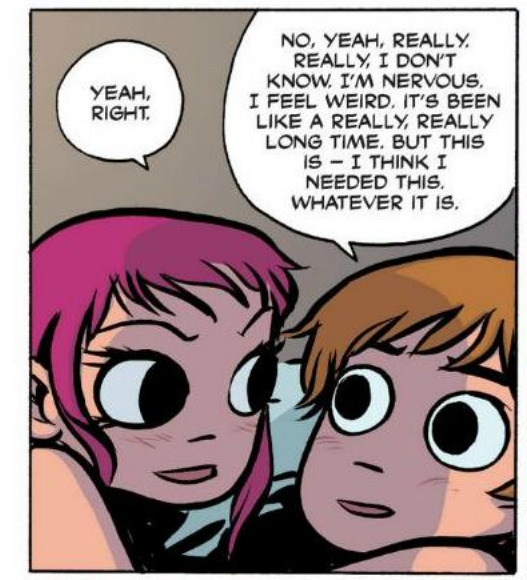
But as much as the series meant to me, it's something I mostly moved on from. After all, the book ended in 2010, and until recently I probably hadn't reread it since 2013 or so. My books are in remarkable condition, actually. I mostly kept up with O'Malley's other works, and preordered Seconds when that was announced. Sadly haven't been keeping up with Snotgirl as much as I'd like, but I digress.
So when the show got announced… well, honestly my first reaction was "That thing they should've done after the Adult Swim short" Because, yeah, animation is a better medium for it. Don't get me wrong, I enjoyed the 2010 movie- one of the best theater experiences because the like 5 other people in the audience were massive fan girls loving all the bits. And there is a lot to love about the movie: its visual gags; the performances; the music selection; the overall direction- seriously, Edgar Wright doesn't get enough credit for how good he is at keying in on visuals. Dude knows how to translate comic panels and mimic the vibe of the source.
But it lacked the depth of the books. There's no major character arc for Scott and Ramona addressing their flaws. Hell, the books weren't even finished yet. There are a ton of great translations from comic to screen, but mostly the superficial. Moments like Scott's meeting with Knives in the alley showing that he's becoming more empathetic and confronting his mistakes are either absent or glossed over. Likewise, Knives' own journey of maturity isn't there.
This isn't a complaint mind you, it's not like those cuts are unreasonable. I can hardly blame them for not cramming 6 (and incomplete) books into a two hour film. That just ain't gonna happen.
The biggest advantage in a series as opposed to a movie is the opportunity to properly explore the characters beyond a surface level.
I'm not saying anything particularly revolutionary by stating the most universally agreed-upon element from the books is that Scott is a bit of a shit.
However, I think that statement is overly simplifying the situation and the character, one far too often invoked by hack frauds who don't truly engage with the work, because clickbait engagement is more valued than a nuanced analytical one.
I won't sit here unpacking the full 6 volumes, you can check out someone like Popculturebuffet for that. But part of what works so well with Scott is that we don't initially know the extent of his baggage- and rightfully so.
His worst aspect early on is ignorantly getting involved with Knives in the first place, stringing her along even after becoming enamored with Ramona, and being a bit of a slacker. This is something which is pointed out by literally everyone (sans Stephen) as being shitty. But otherwise, he seems fairly average and even endearing in a way. Scott's an affable character that's easy to like in spite of his very major flaws, and that's a statement that remains true throughout.
The reader doesn't even get to simmer much on the scenario with Knives until later- and to some degree, this even applies to Scott himself. He's slightly oblivious to his actions, past and present. A prime example would be that we're initially under the impression that Scott doesn't like to drink, which is mostly true. Mostly.

It's not until volume 6 that it becomes clear he got into a drunken fight with Envy on New Year's, suddenly re-contextualizing that and other events. It doesn't negate how Envy was very much a bitch who treated Scott like complete garbage, cheated on him, and screwed his head up something fierce. She is unequivocally the worse person there. But it adds nuance that wasn't present before.
I focus on the event with Envy because it's sort of a perfect microcosm of Scott as a character. Scott "doesn't" drink because of what happened, except on the 3-4 social occasions over the course of the 6 volumes, showing how he has a habit of just flat-out lying in various ways, including to himself.
He's aware on some level, but simultaneously suppresses that awareness from memory and even re-imagines scenarios outright (Sometimes with a little help, unbeknownst to him) acting like everything was always fine on his end. This is even more true in his prior relationship with Kim.

Scott's solutions are half measures where he can pretend that he was always the victim in a breakup, or at least innocent and free of blame, thus never growing in a meaningful manner. Hell, that's the reason he ended up with Knives in the first place; he was trying to get over Envy, but not in a healthy manner. Change is seen as scary to Scott, and yet it's inevitable. That is, at least due in part to Envy changing into a hateful person.
As such, Scott wants something simple where he doesn't have to put in effort. Knives is naive and doesn't see Scott for the dick that he is, she doesn't ask him to be better because he's already perfect to her naive mind. It's shallow, and a tad messed up, and everyone knows it, including Scott- hence his continued dreams about being alone. He knows it's not, cannot, and never will be serious. He's stupid, but not a monster- but stupidity can be a form of malice if one doesn't change their heart.
It's not exactly like the story is even subtle about this. The entire existence of Nega Scott is that you can't fight the past, you can't run from it even if you hate that part of you. You have to confront it and accept it to move on, hopefully changing for the better. To say nothing of how Gideon is what Scott could become if he never owned up to it.
That angle is why I felt Scott and Ramona worked. Quite frankly, Ramona is just as flawed of an individual running from her past. She's constantly trying to change herself, but always on a surface level. She's afraid of normalcy, of being stuck in a routine, of being happy.
She makes out (Not that much) with her ex, Roxie, in anger because she sees Scott hanging with Lisa Miller and suspects the worst. She (rightfully) gets enraged at how Scott was still with Knives when he and her first went out, thus cheating- yet she did the same with the Katayanagi twins, and possibly Lucas. And, ya know, she never formally handed off the breakup letter to Gideon, so she's kinda doing the same thing Scott did with Knives and her.
Ramona's past is just as checkered as Scott's. She's just as jealous, hypocritical, and nuanced. It just takes longer to realize that because she puts up emotional barriers and isn't the titular character/main focus.
Neither one is evil, but they've wronged people. Often they've been wronged, and sometimes it's not a clean-cut scenario of easily blaming anyone.
For all the great supporting cast, gags, fun references, and so forth, our two main protagonists being flawed yet likable is what makes the series compelling.
The heart is two people gradually learning to get over their selves and their mistakes. To stop running away, and accept their faults and one another. Over the 6 books, we see them (albeit mainly Scott) put in the effort to be better, to build and maintain something special, and not just go with what's simple and easy. It's not about fighting the exes, it's about fighting for each other.
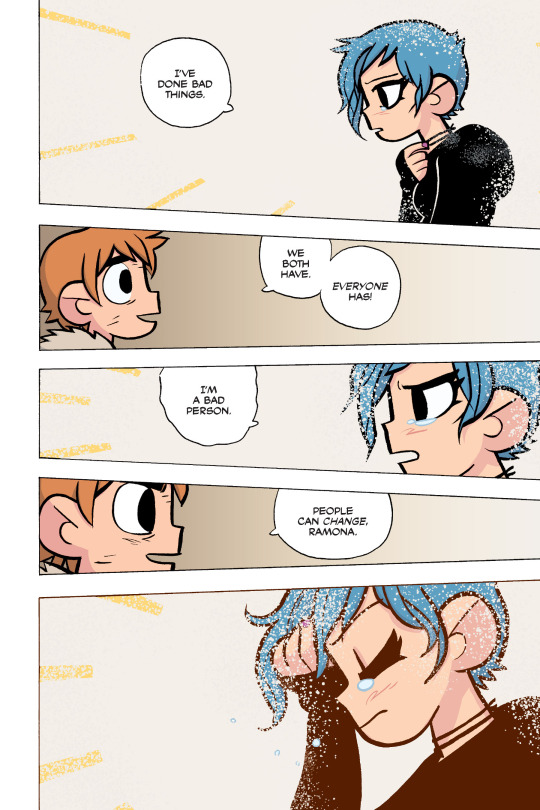
That type of character arc requires time for development.
So, when it comes to this Netflix series, my biggest hope was simply that they would capture that element found within the books.
In the lead-up to the show, there were some rumors about the exes having more to do, and I can see that working. As much as I do think the book does a fine job, Todd and Roxie are the only ones with a decent amount of depth. Matthew works perfectly because his simple backstory is a gag in itself. Lee is a fun character with a tiny bit of backstory, but it's barely there. Gideon I can forgive due to his mysterious final boss nature and his schtick is being the extreme opposite of Scott.
But the Twins? They're shafted pretty hard. They're there to fill out a roster.
Honestly, though, even Roxie would've benefited greatly from the smallest of backstories ala Lucas Lee. She's perhaps the most interesting because she and Ramona are on good enough terms to have coffee together. Hell, Rox genuinely cares for Ramona, and unlike Lucas Lee, she's prominent enough in the story that a simple flashback could have been the cherry on top of all that.
The other part is streamlining story elements. No surprise there. From the get-go, O'Malley said it was not a 1-1 adaptation, and honestly, it shouldn't be. Some parts should be changed for the sake of convenience, and frankly, the book has some superfluous parts. Does anyone even remember Jason Kim? He shows up like twice as "dude with car" and apparently dating Kim Pine until dorking her housemate. That gives the impression of each character having their own life and drama that we're not privy to, which is nice. But it's also not important to include outside the books. Kim (Pine) becoming self-conscious when Envy is brought up, smiling when Scott stays over, or her dead-eyed expression as she lies during the fight with the Twins. All of that says far more about her, her feelings, her love life etc.
Then there's Knives' dad. Fun in the book, wouldn't take him out. But completely unneeded for emotional and narrative development.
Sometimes you gotta look at the source material and realize that even if you like something, tacking on an extra hour for the most obvious whodunit would kill the pacing in an adaptation. (That was a LOTR reference for those playing at home)
However, the above scenarios are a trepidatious path. How does one decide what needs reworking, cutting, or expanding? They're necessary for an adaption, but they're not always obvious. If you're not careful, you can completely undermine or mishandle key elements that made the original so beloved. You risk removing seemingly innocuous moments that add a lot to a character's growth. Above, I mentioned that the Twins got shafted in the book, but there isn't really a good place to expand upon them in the original story. They're not as important as Ramona's growing discontent. It's why Scott's fight with robot 01 is relegated to background gags while we focus on Ramona and Kim. You could put a flashback during the final confrontation with the Twins, but that would muck up the pacing and take away from Kim's far more important character moment in lying to Scott to bolster him. The Twins are just narrative scaffolding holding a spotlight on what we should be focusing on. That's what all the exes are to some extent. Shallow, sure, but only so the other characters get depth.
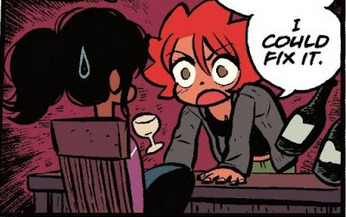
It's not an easy line to walk. If you push too hard on telling a more original story or focus too much on "correcting" various details, you can negate what were otherwise successful plot points. Do too little and the pacing falls apart because the medium is completely different. Would the changes made still contain a similar level of depth and satisfying character arcs, or would it merely be a shallow reworking of the broadest of strokes? The only way to not lose is not to play.
These are the concerns I had in the lead up to the show, which is fairly routine.
We also weren't getting a lot of information storywise, aside from that it would be mostly doing its own thing (This is something that should have been emphasized more in marketing) The trailers showed familiar set pieces; that Ramona delivers DVDs for Netflix now, which is a great and absurd change; You saw some of the streamlining by having Scott rent Lucas Lee films, thus inadvertently getting a head start on that and cutting out the No Account Video segment; there's a brief original bit where Ramona talks to Julie about how well the date with Scott went. Most of the setting also looked like it was from the first and sixth volumes, which was a tad odd.
But other than that, they were tight lipped about the narrative. Most of the promotional focus was on music, the returning cast, and the animation. All great things unique to this medium that we will get into in due time.
Speaking of, let's finally discuss
Scott Pilgrim Takes Off
So you know how Final Fantasy 7 Remake emphasized the "Remake" part? Well, we kinda have that here with the "Take Off" part.
I'll just cut right to the chase. Scott seemingly dies in the fight with Patel in the first episode.
Episode two is his absolutely absurd funeral. Almost the rest of the episode is centered around Patel wanting to take over the league for himself, and succeeding in doing so, gaining all of Gideon's assets, while the league dissolves once they realize Patel didn't even get Ramona back after winning.
This is uh, certainly a direction to go.
Let's put aside not following the source material and this being an original story. Why should I care about this story? I'll concede that he and Gideon have a great fight. The animation from Science Saru is great, and the voice performances are great: Shoutouts to Satya Bhabha, his delivery is impeccable, hilarious, and a major highlight of the show.
But why should I care about these events, this retake? What's the hook?
Thus far, the primary purpose of the show feels like a fake out, gags, and fights. I spent the opening of this review going over the emotional weight of the books, that's the anchor. So far, I'm getting moments without substance. Am I supposed to care because I have a prior connection to these characters? This is something I wouldn't figure out a proper description and answer for until the finale.
My issues also felt exacerbated by both the advertisements not making the original story angle clear, and also how good the first episode starts off. Because Cera as Scott is truly perfect. Cera was a voice actor before transitioning to the screen, and his performance is top-notch in addition to being a great vocal fit to begin with. So it's kinda disappointing to not have him around for quite a bit.
Anyway, the second episode ends with Ramona dreaming and hearing Scott's voice, meaning that Scott isn't dead, he's in Subspace or somewhere.
Episode 3: Ramona Rents a Video.
As if answering one of my questions immediately, the third episode finally gives a hook as Ramona starts playing detective, like Pikachu Columbo. That's the selling point, that this is primarily Ramona's story.
She checks out footage of the Patel fight, showing that someone pulled Scott through a portal (Hence the title of the show, wink-wink.)
Ramona then heads to First Cup to get a person of interest list from Julie- which is a pretty damn funny sequence, actually. I'm starting to enjoy the show at this point, and it's kinda wild how much more enjoyable Julie is in both the movie and show compared to the comics. Sure, she's a bitch, but she's a fun bitch due in no small part to Aubrey Plaza's wonderfully riled vocals.
After getting the necessary info, Ramona is led to Kim since she knew Scott the longest. We even get a cute story about the poorly drawn Sheep Scott did, which looks hilariously WAY worse in the show.

There's also a key comment from Kim that I think is to make a point for dorks like me. Kim mentions that she was once kidnapped by a guy named Simon and rescued by Scott. That was a false memory of Scott's in the books. In vol. 6, Kim pointed out to Scott that Simon was just a dude she went out with like twice, probably hugged, and Scott beat up. This is one of a number of clues that seem to be here to firmly establish this isn't the same continuity as the books being messed with, and should not be thought of as a sequel if that was a concern.
Anyways, their conversation is cut short when Roxie arrives in the hope of rekindling her former flame. But things go south pretty quickly and Roxie's hotheadedness takes over.
What follows is one of the best fights in the show, equal parts funny and clever. Hell, it starts with Rox drawing her sword and accidentally cutting the sprinkler line. It adds a dramatic pseudo rain that's completely negated by Kim's wonderfully deadpan expression as all the damn tapes in the store become soaked.
During the scuffle with Ramona, a shelf of movies falls on the two which… somehow transports them into various movies? I dunno, we're working off video game logic, I guess Gex counts.
It's a sequence that I'm sure was done purely for looking interesting. To its credit, the visual styling is on point. From Japanese historical drama to a post-Matrix early 2000s green filter era, to a scratchy film-grain-heavy WW2 film. The backing track also flows into each film genre. I also love a quick gag where Kim watches the fight on a CRT and fucks around with the rewind and pause feature, allowing Ramona to counter an earlier attack. Roxie gets knocked back into the store, smashes the remote, and gets dragged back into the movies by Ramona. That's great.

As the fight continues, Ramona and Rox begin arguing about their relationship, and we get that flashback sequence! It's a small thing, but they show that Ramona left without a word and how that tore Roxie up. Good lord, someone hug that poor girl, she looks like a sad puppy. In a legit great moment, Ramona has to confront how she treated Roxie, sincerely apologizing for it, which Roxie tearfully accepts it. I gotta say, Mae Whitman really gets to shine in the role more than ever. She's one of those I point to when talking about just how perfect everyone sounds exactly how I'd expect.

After the fight, she hangs out with Ramona and Kim for a bit, being very flirty with both. Kim even smooches her for the hell of it, although both admit there wasn't anything there. But hey, they managed to still get a Bi-curious Kim in here, and in a way that was better than in the books.
Elsewhere, a beat-to-hell Gideon arrives in town, meeting with Julie, an old schoolmate.
I legitimately liked this, there's actual emotional weight going on, there's interesting shit being done, and I'm settling into the show's intent. I like the idea of giving Ramona her own story with a slight focus on how she feels about her past. I think her going out of the way as much as she does for Scott, a dude she just met, is a little flimsy. Again, it's really expecting the audience to care because we, in theory, care about them getting together.
Ep. 4: Whatever.
Things get really fucking meta in this one.
Ruling Roxie out as the kidnapper, who didn't even know Scott was alive, Ramona turns her attention to Lucas Lee, who is starting a new picture in Toronto.

Turns out the movie is from Young Neil's screenplay, which "he" wrote back in ep 3, or rather a mysterious "sleep paralysis demon" he saw did. The movie is about Scott's life if he won the fight with Patel.

This toying with the universe thing is getting a little unsettling.
Most of this episode is one big meta gag about making a Scott Pilgrim movie with Director Edgar Wrong.
I'm not even mad at this, I'm just completely flabbergasted at what the hell I'm seeing. And this will become a reoccurring bit throughout.

Also hope you like gags about Knives' age cause holy shit they reference this a lot throughout the show.
It's at this point in my viewing process I have developed a headache.
To give some credit, Lucas is fun in this episode. He's more in line with the film version, and Evans actually sounds better than ever, likely thanks to age and simply having more to say. And like with Roxie, Lee has a Flashback. There isn't much more than what was in the book, but I think the presentation is better. Seeing Ramona patch him up after a bad fall, and Lucas arranging his Locker (which is filled with photos of Ramona) as she and Todd walk behind him. Man, that stings.
Needless to say, Lee isn't responsible for Scott's disappearance and with the whole "controversy" regarding him dating a 31 year old actress playing a highschooler, he's hounded off the lot and has to be replaced by Todd, which seems to be a reoccurring thing for him.
Ep. 5: Lights. Camera. Sparks?!
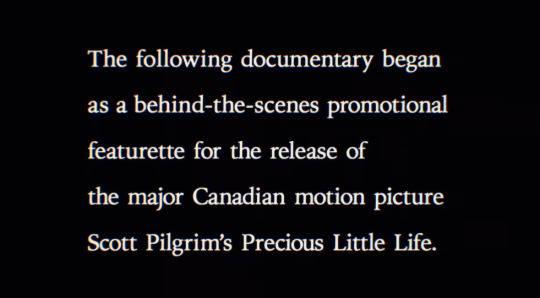
I'm now starting to believe this entire show may have been an elaborate troll towards people obsessed with adaptation accuracy to a fault. I almost want to applaud the sheer audacity of it. Suffice it to say, 95% of this episode is done in a documentary style, and there are a lotta hijinks on set. Ramona is working as Envy's stunt double just so she can have easier access to the set and hopefully get a lead from Todd. Wallace also bones Todd. A LOT.
Oh yes, Wallace shacks up with Todd, and Todd is really into it. Wallace, on the other hand, just wanted to hook up with a hot dude, leading to a whole excursion and depressive vegan breaking episode for Todd. Brandon Routh really gets to go full ham here, and it's wonderful.
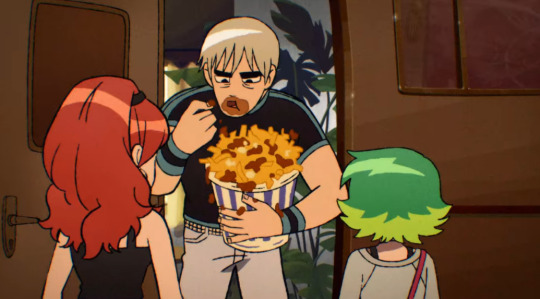
Some damn funny parts aside, Todd wasn't behind the portal, but it was certainly vegan in nature.
Ramona is otherwise back to Square one until Patel, by happenstance, arrives on the lot to fire everyone.
Afterward, Patel has a brief confluence with Stephen Stills and Knives, who manage to get an in with him. Since Scott's apparent death, Knives has taken his place in Sex-Bob-omb on Bass (and keyboard) making decent music with Stephen Stills. The importance of that will come into play next episode.
Patel then turns his attention to Ramona. Obviously, Patel wouldn't have any reason to keep Scott around, but it's entirely plausible Gideon, or rather his real identity, Gordon Goose, would as part of a revenge scheme.
Ep. 6: WHODIDIT.
This episode starts with probably the best opening gag that I kinda don't wanna ruin despite spoiling everything else. I'm probably gonna be adding "I was gone for 90 %#&! minutes" to my quotes, though.
In any case, this is a fairly straightforward episode. Ramona interviews Julie once again, but it becomes clear that Gideon, Goose, has neither the mental state nor resources to pull something like that off. As an aside, we get a flashback with him as well, showing that he was the school nerd. He supposedly had no fear (No pain) until he aimed well above his status in asking a girl out, leading to him being laughed out of school, which Julie remembers all too well.
It seems like another dead-end, but when Ramona accompanies Julie back to her house, they both see a familiar Robot, the Twins' 01 Robot, which has been making very unsubtle appearances in every episode up to this point; Lee's place; outside the video store; the studio lot, etc.
We also have a B-plot with Stephen Stills and Knives making music for a stage adaption of Neil's Screenplay so it doesn't go to waste.
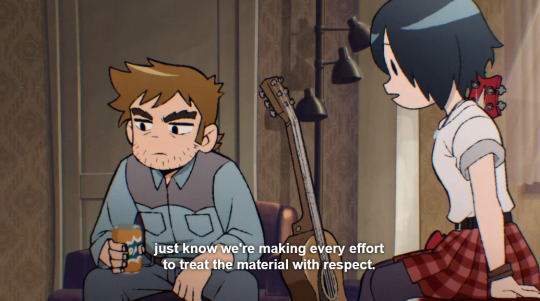
Cute.
It's here where it becomes known that Neil didn't write the script, and upon checking the original file, realize something is off and that Ramona should be informed.
All parties gather in Ramona's apartment as she goes over the pertinent information in whodidit (dunit?) fashion, including treating us to another flashback, this time with the twins. It's probably the least engaging of the flashbacks, honestly. Even in this, they get shafted. Regardless, the who and how are solved. But Not the why or where. Where Scott is remains a mystery, but it's likely the Twins know, which is where Ramona intends to check out.
Oh, and the information the gang has about Neil's Script? The metadata says it was written 14 years from now.
But just as more questions are raised, another winds up on Ramona's doorstep; Scott, safe and mostly sound.
The Twins were in fact behind it, and the robot, and… himself.
Ep. 7: 2 Scott 2 Pilgrim.
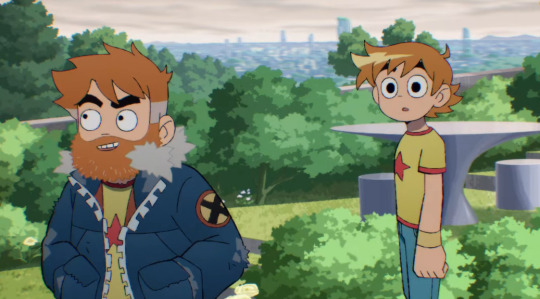
Yes, the one who pulled Scott out of Time was himself, from the future; a 37 year old Scott. The how is rather simple and already answered; the Katayanagi twins. Older Scott and them became friends in the future, even starting a band; Pop'n TwinBee (RIP Shatterband.)
By the way, if you ever wanted to hear Will Forte sing a hilariously bad cover of Konya Wa Hurricane from Bubblegum Crisis as an older Scott Pilgrim, this is the show for you. I was laughing my ass off at this.
Anyway, the robot was disconnected from a fixed time stream, and being a vegan cause, ya know, robot, is able to create portals. Therefore Time portals.
As to the why, Scott showed his past self using a virtual reality machine on the Virtual Guuy[sic], complete with red and black pixel art mimicking the style of the game. Past Scott sees memories on the not Virtual Boy; Defeating the Evil Exes, future marriage to Ramona, their honey moon at Universal… and divorce. Well, technically they're just separated after 13 odd years of marriage. Older Scott has since been living with Wallace and his husband.
Exactly what happened is never stated, just that the pain was so much Scott decided to follow through on a sarcastic comment from Wallace and prevent falling for Ramona in the first place.
Old Wallace sums up the mental state of Old Scott to regular Scott, describing it as "Like after Envy, times ten." Which uh, yeah, no wonder Older Scott's a tad kooky.
It's at this point I have to bring up personal stuff, and it's something that I thought I might have to. So, when Scott Pilgrim's Finest Hour dropped in 2010, I distinctly remember reading an interview with O'Malley about the ending. In the lead-up to the final book there was a lot of speculation from fans that maybe Scott and Ramona wouldn't end up together (there was a strong case to be made for Kim) maybe it would end badly since both Scott and Ramona have their struggles. Some people even thought he would end up with Knives, which is missing the entire point of her character arc, and also fuck no.
Ultimately we got the ending we did because, at the time, O'Malley was happy, so he thought Scott should be happy. But O'Malley divorced in 2014.
I dislike bringing that up, but that was leading me to speculate (and brace myself) if that would have an impact here. I mean, how could it not? And look, there is a good argument that Scott and Ramona needn't stay together for their journey together to be satisfying. It would fit right in line with the theme that things don't always stay the same. People can grow apart, even the important ones that change your life. I don't like that outcome, but it's not as if it's wrong to consider. Particularly for a story like this.
But I also think there's an element of overt cynicism to that. What's interesting is that the show doesn't go in that direction. In fact, it's actually insistent that Ramona and Scott can't help but be drawn to one another, there's a spark there.
We even get a scene of Scott hooking up the 01 robot to the VR, and since 01 is connected across time, he can see into the past versions. The robot seen throughout the show was Scott seeing that Ramona was constantly looking for him, and that's genuinely sweet.
Still, the situation is bad, as Scott is trapped in the future and can't use the Robot to travel for reason.

On Young Scott's insistence, he and Older Wallace meet up with Older Ramona, discovering she was the one who went back in time and wrote Young Neil's Screenplay in a failed attempt to preserve their story and hopefully thwart Older Scott. (Let's not go crossed-eyed thinking too hard about paradoxes)
He's a misguided idiot, but Ramona still loves the moron, even if she has her doubts after her failed plan. But Scott's words of encouragement about his Ramona never giving up on him gives her hope.
Importantly, she can time travel with her DeLorean roller blades, which is how Scott can and did get back to the past.
But even after Scott's return and reunion, their problems aren't over, as a force field prevents Ramona and Scott from kissing. Someone is still interfering, and the list of who might as well just be the entire list of exes.
Thankfully, Stephen Stills and Knives have a convenient plan: The stage musical is going to have all the exes in attendance, so they've got one big gathering spot to get to the bottom of this.
This is one of my favorite episodes of the show. It's cool seeing older versions of the characters, and frankly, the presentation is just great. I do think that too much of that emotional weight is relying on events from the books for your investment. I know, I know. Can't enjoy a good thing without a critique.
Still, this is a great episode, one of my favorites along with ep. 3, and our next and final episode.
Oh, and the end credits has a proper rendition of Konya Wa Hurricane, so that's fucking cool.
Ep. 8: The World Vs Scott Pilgrim.
So here we are at the big finale at the premiere of the Scott Pilgrim Musical.
The thing is, none of the exes seem to be suspect. Gideon is the only one with ulterior motives, but they're not towards Scott and Ramona, he just wants to blow up the stage and Matthew Patel.
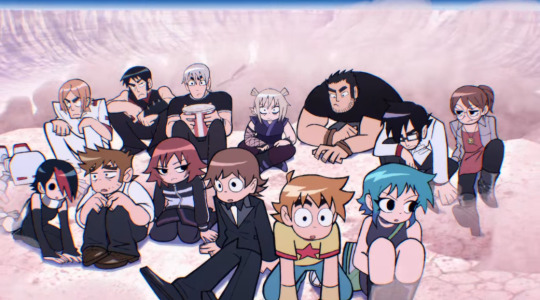
But not long after everyone is seated something goes awry. A portal appears and transports all the exes and Scott's friend group (And also Julie and the robot) to a barren land.
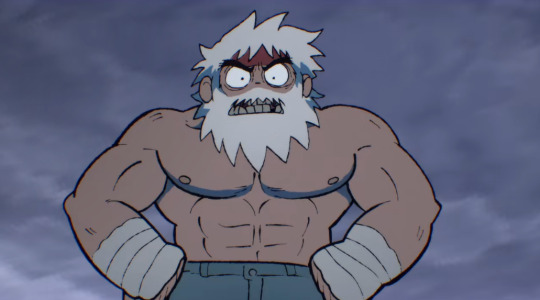
The one behind this, and the force field, was an Even Older and very buff Scott (47) He slipped past Scott nano machines as a backup to prevent him from ever getting close to Ramona, but even that wasn't enough. So for 10 years he trained to take everyone out, as it's the only way to be sure.
And so our final battle begins: The World vs. Scott Pilgrim.
If you listen closely to the track during this scene "Big Bad" incorporates elements of "The Dark One" Nega Scott's theme from the game. That's a nice touch.
Even Older Scott is no pushover, he breaks Ramona's Hammer, and despite a fairly good comeback from regular Scott, he beats him pretty bad. The others come to his aid, Knives attacking with daggers, but Even Older Scott punches Knives so hard he knocks the highlights our of her hair.
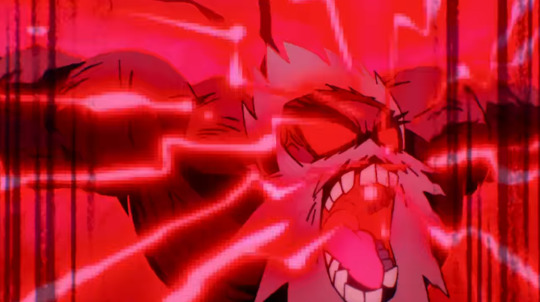
Ramona begins handing out items from her bag, cyber broccoli for Todd, a cyber skateboard for Lucas, and a cyber sword for Roxie, just as the sub boss music from the game kicks in. Along with Matthew's mystic arts, they mange to actually lay into Even Older Scott, but that only causes him… to go… even further beyond, and One hit KO the four.

The Twins Robot is ineffectual and even Gideon's not quite the glow-douken has no effect. Even Older Scott just grabs it and turns it against Stephen, Knives, Kim, and Neil.
This. This is actually fucking awesome. It's going full Shonen ham.
We're down to just Ramona and Scott, who team up and hit him together, followed by Scott and Even Older Scott literally butting heads. We get our obligatory speech between a younger Scott just wanting to live his life, and Even Older Scott saying he'll just end up where he's at if he does.

And it finally clicked into place what the hell Scott Pilgrim Takes Off actually is. This is like a Shonen spin off story. Your Broly Trilogy, Hunter X Hunter The Last Mission, Naruto Blood Mission. But with an X-men time travel plot slapped on.
It's an excuse to play around and do different (mostly cool) shit with a set of familiar characters.
Like a movie or OVA, the characterization isn't as deep as the main source material. It banks on you giving a damn because of the familiarity so they can mostly get right to the cool bits and not try as hard or waste time on the re-interpretative parts. Don't think too hard about the misgivings, think about Akuma Scott beating the shit out of everyone while the familiar music you're nostalgic for plays.
And goddamn that's frustrating because that's what they should've led with. All the damn trailers were dancing around the new material and making it seem like an adaptation. To keep on the Anime brand, if people are expecting a "Brotherhood" or "Ultimate" version with a Cast they like, and then they don't get that… well yeah that's not gonna go over well. I can't fault anyone for being mad about that. That's having the rug pulled out from under you.
But once you realize what this is, and what it's doing, it's a lot easier to enjoy and be its own thing. It branches off a similar story to the books, but it's not like this is a canonical revision or sequel to them.

That said, just because it's "less developed" doesn't mean this is without heartfelt moments I enjoy. When it seems like Even Older Scott has the upper hand, an even older Ramona shows up to chew old Scott out for not even texting in 10 years, fighting people in the past rather than fighting for them, all because of one rough patch.
It's funny, but it also confirms the biggest divergence. This is a world where Scott was never kicked out during the Roxie chapter, a world without Gideon's "Glow" mental manipulation, and presumably Scott never faced his inner demons because of it. This also means Ramona didn't run off after the twins' defeat because the glow wasn't affecting her mentality, and thus she faced her own. That one line snowballs into a lot of stuff not happening for their character growth.
That- that is an interesting concept.
This all leads to a poignant scene where Ramona questions her older self if she should even bother. What's the point if it ends up like this? Maybe it's best to just keep moving.
But, that's also Ramona's thing, isn't it? Running away from what she loves, which is presumably (along with his own stupidity) what set Older Scott down a spiral in the first place. In a scene that parallels Scott's own understanding within the books, Ramona comes to realize she's ran all her life.
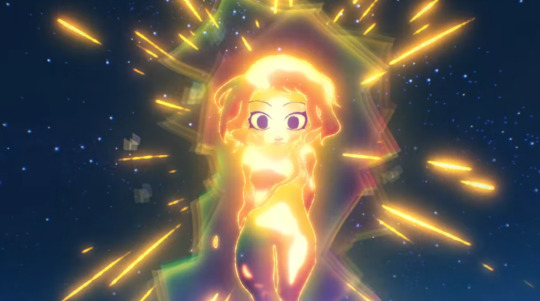
In the end, Ramona chooses to stop running and embrace herself, quite literally.
Both Ramona's combining into, as Scott puts it "Super Ramona" Able to see the situation for what it is, one Scott still in many ways a dumb kid, the other Scott just a sad mess. She simply sends Older Scott back to his time with the hope he'll straighten out. Meanwhile, the nano machines are still a problem with current Scott. But that's nothing a super form can't overload with a determined kiss. Daww.
Before things go back to normal and because she'll have trouble saying it later, she tells Scott she loves him, and that she tends to run away from what she loves. But who she was in the past isn't who she is now. She just needs help remembering that.
Everyone returns to the theater to enjoy the rest of the musical, and Patel's demon girls subvert Gideon's plans. After the show, he and Julie are apprehended, but Matthew instead begs Gideon to take all his crap back. He has no idea how to run a company, is stressed out, and has lost billions. All Matthew wants is to continue the stage show.
We then get an epilogue. Lucas Lee takes up a job at Second First Cup; Todd has returned to being a Vegan with coaching from Roxie; The rental store Kim worked at closes down; Wallace takes a vacation to Paris where he meets Mobile; Knives continues performing with Sex-Bob-Omb as their keyboardist; Ramona gives up delivery work and instead returns to being a stunt double.
We end on Ramona coloring her hair once again, before heading out and meeting with Scott and the others, as Plumtree's Scott Pilgrim plays us off.
Only for a mid-credits scene to show Gideon and Julie plotting revenge. Oooo.
And that is Scott Pilgrim Takes Off.
s'allright, innit? Okay, joking aside- I think I'm gonna have a hard time conveying my feelings on this one. But I still have three more things to talk about before we get to my final thoughts.
First off, the voice acting is great, shockingly great. I'm a person who is very much of the mindset that you should hire voice actors for voice roles BUT, in this instance, I can understand why. It's incredible they got everyone back and how well they work. I've already given my praise to Cera, Bhabha, Plaza, Whitman, Routh, and Evans in the story portion of this review. But I'm drastically overdue to talk about Winstead's performance. I think this was the one people were most curious about because in the movie there was this aura of Ramona feeling more "cold" in her personality. This was due to the original direction they wanted to take that version, and sadly it meant we didn't quite get a more angles. Here? Yeah, this is pretty great. We hear Ramona full of regret, angry, annoyed, sentimental. It's a much more well-rounded version. My one nitpick is Winstead needs to work on her battle cries, it really stands out in the Roxie fight opposite a veteran VA like Whitman. But otherwise, this is how I imagine Ramona sounding.
And I'd be remiss if I didn't bring up how anytime Ramona has a vulnerable moment talking about Scott, she genuinely sounds smitten. The Future Ramona (the first one) in particular stands out to me. That's a version of the character that's older, clearly hurt, and weary, but still very much in love.
I can't help imagining that being applied to scenes from the book. In Vol. 5 the part after The Twins are defeated and Scott returns. That scene always tears me apart when I read it. I'm fairly certain if I heard Cera and Winstead's performance of that it would rip my soul out. So maybe it's best we only have this original story.
So yeah, I'm happy to see that she fits right into the role better than ever.
Another performance I've yet to mention is Ellen Wong, who is just as perfectly energetic as she was in the film. It's a shame we don't get to hear her do a somber Knives in this setting, but it's hard to complain with how pleasant it is hearing her chipper over the top excitement.
Alison Pill's Kim Pine is as sardonic as always, and much like Routh and Evans, I think she's even better now.
Johnny Simmon sounds exactly the same, no complaints, 10/10.
Jason Schwartzman is an experienced VA, so no surprise he sounds fine. He doesn't get to stretch out much since Gideon isn't super prominent here. Although episode 6 did show a lot of range and potential for what you could do with him. Maybe next season?
Similarly Brie Larson's Envy doesn't have a whole lot of screen time, but she's equal parts charming and manipulative. Honestly, for a small as the role is, it made me realize just how much Larson is good at the role and how that level of emotion is often subdued in roles elsewhere.
Honestly, I hate to say it, but Mark Webber's Stephen Stills is probably one of the weaker performances on the show. It's not even that it's bad, it's fine and works- except for the animation. That's the one caveat. There are a couple of moments where Stephen Stills is pantomiming, and the voice doesn't match that energy. Truth be told, I even sorta have a similar issue with Kieran Culkin's Wallace, which I swear looks like the syncing was off in the earlier episodes. The saving grace is that Wallace has more scenes than Stephen Stills and therefore Culkin got more opportunities. This is sorta the area I mean when I think it's best to get trained VA. It's a completely different medium and hard to jump into immediately.
I don't wanna end this segment on a downer, so I'll once again mention Will Forte sings Like a Hurricane. OH, Segue.
Soundtrack
So I did not know what to expect going into this. I mean, I was a fan of Anamanaguchi, but I hadn't kept up since Endless Fantasy, sans the Miku single- which is really good by the way. And Joseph Trapanese I was most familiar with from his collaboration with Daft Punk on Tron Legacy, so no worries there.
But I did wonder how well a chiptune heavy sound would work. As much as I dig it, it's a very upbeat vibe. Even some of Anamanaguchi's more dramatic tracks have a charming bubbliness to them. How would that work within a series? Well, the short answer is they don't have as much chiptune going on as you would assume. There are a few that incorporate chiptunes to a limited degree, others a bit more, but most not at all.
The vast majority of the OST is more traditional fair and Synthwave, and in a way, it sorta mimics my own evolving tastes. I still listen to Chiptune stuff, but I'm also really big into synth music nowadays. It feels like a proper bookend to my late-teens early twenties listening to Anamanaguchi, and later Dance with the Dead and Midnight Danger, and now Anamanaguchi's synth offerings.
One of the tracks, Yet Another Winter Again (Calling back to the first stage in The Game) has a Redbook audio sound with a hint of Chiptune, but not the NES/GB Anamanaguchi is known for. It sounds like a SNES. In fact, I would compare the track to something you'd hear in VA-11 Hall-A. So even when there are chiptunes, we're branching out quite a bit in both sound fonts and style.
Of course, there are a couple of vocal tracks as well. Like the movie, there are universe songs for Sex-Bob-Omb. They have a unrefined roughness to them, which is perfect for a small unprofessional indie band.
As for some of my favorite tracks, the aforementioned Yet Another Winter Again; He's You; And They were Roommates; Blame it on the Goose; Big Bad; Bad Guys; Knives & Kim; and God Only Knows.
I'm sure that'll change as time goes on. I'm really digging Lucas' flashback music, and Fond Memories, nice parallel between those two. In fact there's quite a few pieces that, in tandem with the animation, do a lot to sell those heartwarming (or wrenching) moments.
Animation.
Oh right, the animation. So, if you read my Castlevania Nocturne review, you know I went on a slight tangent about how I think it's silly that they labeled it an anime despite it being produced and partly animated in goddamn Texas. It was just a label because they're embarrassed to call their super serious animation what it is because they think anime sounds more mature. I swear some people still think it's 1985 and Vampire Hunter D is the wildest shit cause blood.
Funny thing about Scott Pilgrim though, it's just straight-up animated by Science Saru. I'm not here to get into semantics, because then we'll be asking if Batman TAS counts because Sunrise. I just find it funny. At the very least Takes Off certainly fits the bill more than Nocturne does.
But back on topic, it's fucking good. I mean, I don't think that comes as any surprise. Science Saru has made a name for doing really impressive work from Devilman Crybaby, to Keep Your Hands Off Eizouken!, and the shorts Akakiri and T0-B1 for Star Wars Visions. Not to mention supplemental work for the Garo anime, OK-KO, and Adventure Time.
So Scott Pilgrim is perfectly in their wheelhouse, and they do an incredible job capturing O'Malley's illustrations while adding their own unique flare to the styling.
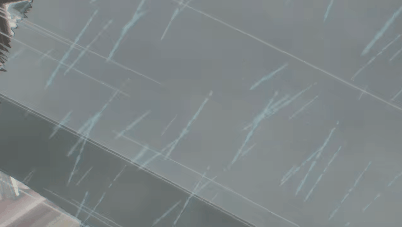
Sadly Tumblr's gif size limit means I can't easily showcase some of the fights as much as I'd like, but suffice it to say the level of fluidity and cinematography is astonishing. Again, episode 3 is an amazing showcase in itself.
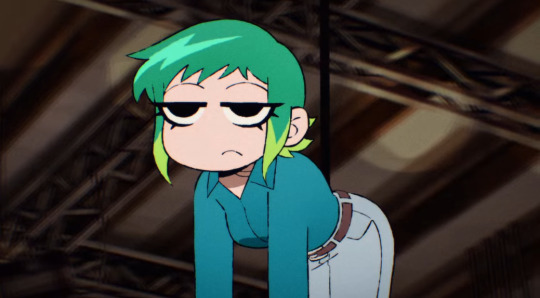
To say nothing of how expressive everyone is in the show.
Also this is a weird one, but I think with the exception to episodes 5 & 7, each episode has Ramona going through a bleaching and dye routine. It is bizarrely satisfying to watch, like the tea making in Samurai Jack.
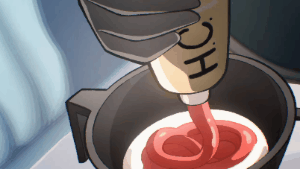
Final Thoughts.
Takes Off was both a confusing shock and a pleasant surprise upon first viewing. It's impressive in its existence, and has moments that I fucking love. Like the Shonen it emulates, it does also come off as a tad superfluous or melodramatic in many respects. But it is fun to bust out old toys and play with them again. The fact that in 2023 I'm seeing a new work related to Scott Pilgrim is fucking incredible. I'm happy that this exists, I'm happy to hear the cast together again, and happy to hear some great music tracks.
And I do love the characters of Scott Pilgrim, I love the performances in this show, I love numerous parts of this show. But, I also think it's fair to say what I love most aren't these characters. And that's okay. Those characters should remain in the series that ended in 2010, while these are easily malleable versions for an animated series to have fun with. Maybe you could never capture or replicate the exact magic of the books again, so it's better to just do your own thing. Takes Off was, in the end, a fun time that I think works best when you know what you're getting into. Once you're armed with that knowledge, I think you'll find a show much easier to appreciate.
All that said, as backhanded as this is going to seem, I still think the nicest thing that Takes Off did was get me to re-read the book series for this review. I got to re-examine a profound series from the perspective of a 31 year old, but still find all that I originally loved as a 17 year old. When it comes to adaptive works, no matter what, the nice thing is you'll always have the originals to go back to. You change, maybe your tastes change, and certain things hit differently or don't hold up when you go back. But it's nice to revisit. I think nostalgia can be a poison. Too many people get caught up in wanting to relive the exact moment, to be trapped. But I think it's more fun to see something you love still remain a love even after so much time has passed. I'm happy with how I felt as a teenager reading a story about emotional growth. Some personally, some apart, and others closer. In my 30s, I still appreciate that, and it still affects me and resonates.
But just because I cherish that above all else doesn't mean I wouldn't be interested in more Scott Pilgrim. And if O'Malley and Grabinski wanna make more people sing 80s anime songs badly, I'll be on board for that alone.

Or Roxie flirting with every woman. Seriously, she's so much fun.
As always, thanks for reading. Reblogs are appreciated and you can find me elsewhere on the worldwideweb at:
Bsky
Ko-Fi
So does Gideon still have his exes frozen somewhere, or is that another difference?
Oh, and now that we have a Netflix Series, can we get a Nendoroid Ramona? There's been like no high end merch since Mondo in 2017.
#scott pilgrim#scott pilgrim takes off#netflix#bryan lee o'malley#edgar wright#bendavid grabinski#science saru#anime#animated
8 notes
·
View notes
Text
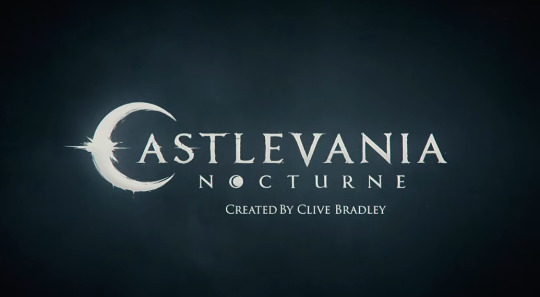
With this new season of Castlevania alleged creepy sex weirdo Warren Ellis was out as head writer, and Clive Bradley was in. Bradley is known primarily as a crime and horror writer, whose works I wasn't too familiar with before this. That, in addition to the events of season 4, left me with basically no expectations for what direction the show would go.
That said, The first episode perfectly sets the stage for the rest of the season. It is efficient without feeling rushed or over-stuffed. It is concise while covering a lot of ground.
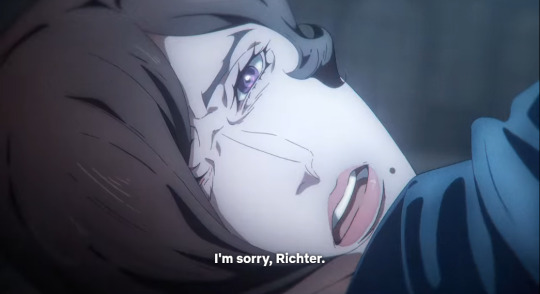
We open on Richter being sent away to France for his protection, but in the process, his mother, Julia (Sophie Skelton), is killed by a powerful vampire, Olrox (Zahn McClarnon).
Nine years later, in 1792, we find Richter (Edward Bluemel) with this adoptive sister, Maria Renard (Pixie Davies). Maria is a witch and a young revolutionary fanning the flames among the peasants, making her and her listeners targets for the literal bloodsucking cronies of the upper class. Although they pose no threat to our two heroes.
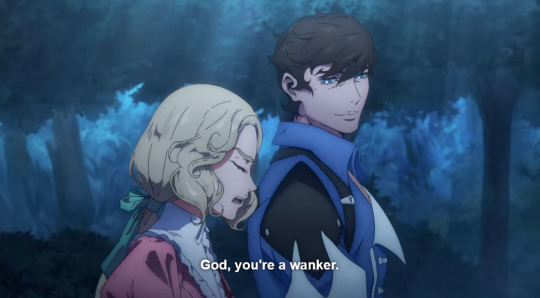
Richter and Maria right off the bat have a great sibling dynamic. While it would be a stretch to call this young cocky Richter level-headed, he has a comparatively cool demeanor to Maria's short fuse. Maria herself is a lot of fun. She is foul-mouthed and rebellious in a "burn the bourgeois" sort of way, which puts her at odds with institutions such as the church.
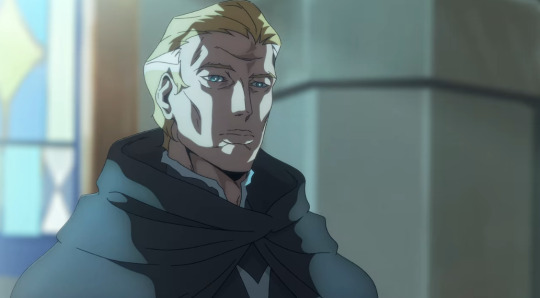
Still, the two meet with the local Abbott, Emmanuel (Richard Dormer), seeing as one of the attacking vampires mentioned a Vampire Messiah. Although the church is of no help.
After that excursion, there's a slight respite in Richter's domestic life, focusing on Maria and her mother, Tera (Nastassja Kinski). We see that Richter suffers from PTSD nightmares over his mother's death. He's awakened by an attack on the homestead by night creatures, something neither Richter, nor the rest of the household, has experience or knowledge of, resulting in a pretty brutal beatdown.
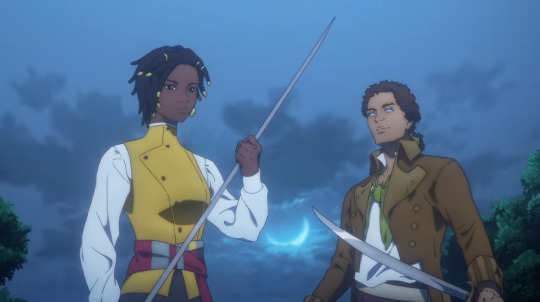
He's saved by the timely intervention of Annette (Thuso Mbedu) a former plantation slave who can manipulate rocks and metals; and Edouard (Sydney James Harcourt) a revolutionary opera singer. Both were looking for Richter in hopes of stopping this vampire messiah.
Elsewhere, Olrox arrives in France to meet this messiah.
As I said, this episode covers a lot of ground. The back story for Richter, supporting characters and their relationships, major events being set up, more supporting characters to explore, and a lot of small character moments. That last one I think is the most important because there is a lot of that sprinkled throughout, along with some quick dialogue that explains small details. For example, when Richter is a child there's a quick line about how Tera isn't a vampire hunter. Richter is talented and has some training, but we see his limitations with the Night Creatures.
There's some other stuff too, like Richter not having much thought on the current affairs of a classist system, but finding Maria and her mother good people with good intentions, so he stands by them. He has a good heart, but he perhaps doesn't think much about the world at large the same way Maria does.
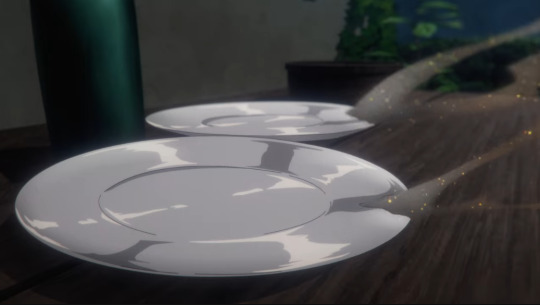
Another small but appreciated bit is Annette's spear turning into dust and reforming as plates. You immediately pick up on her metal manipulation ability, and it's nice that Maria isn't the only one with unique magic (that being the Sì Xiàng.) Not to mention this also sets the ground for a much larger world of magic, like say, Richter's Item Crash abilities from the games. And yes, that is a key component because Richter lost his ability to do any magic after his mother's death.
In fact, episode 2 expands on that very thing while also explaining that Annette's powers came from her father's side, leading all the way back to her culture's God of war, Ogun (They don't specify which African Religion.) An inheritance of magic would become a running motif throughout this season. But That's just a small part of this episode.
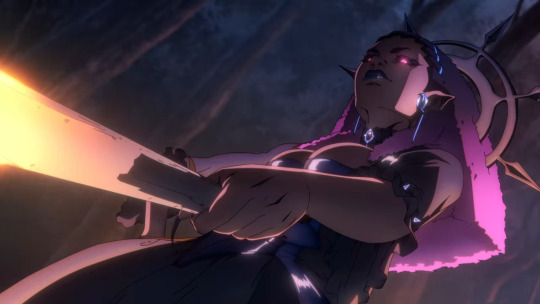
The real meat of the second episode is the arrival of the Messiah's Emissary, Drolta Tzuentes (Elarica Johnson) to France, and Annette revealing the vampire messiah's name; Erzsebet Bathory. This triggers memories in Maria's mother that she had long kept secret. Tera was originally from Russia, part of a group of speakers helping a small village until they were besieged by vampires. Tera lost her sister to vampirism in the process and was forced to kill her. She fled until she reached France and was taken in by Emmanuel, hoping to leave that nightmare behind.
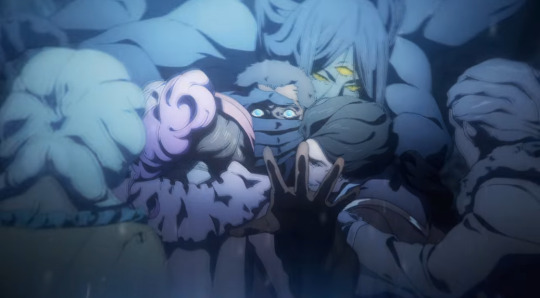
With their best lead being an Island chateau with nightly parties, Richter, Maria, Annette, and Edouard, skulk out the place in hopes of finding out where the night creatures are coming from. While spying on the partygoers, Annette spots her former slaver, Vaublanc, and nearly loses control of herself. Regardless, Vaublanc still takes notice and things quickly go south. The four flee an onslaught of monsters, but only three make it out. Edouard is overwhelmed and slain in the chaos. His body is brought to the Abbey along with other corpses to be made into night creatures in the cellar.
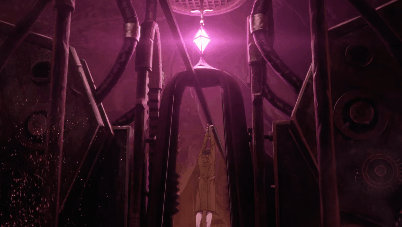
Unlike the slow methodical smith-like process of the 1400s, the demon forging process has become industrialized.
Something I didn't care for much (at first) is that Edouard is turned into a night creature where it's basically just him but with monster appendages. So his midriff and face are perfectly normal. Everyone else turns into these barely recognizable monsters, but you know his features stay intact for future drama. We'll get back to that.
Episode 3 focuses on the group comforting Annette's loss, and her in turn opening up to the group about her past. Seeing her mother killed by Vaublanc, the awakening of her powers, her escape at age 16, and of course her meeting with Edouard. Edouard hid Annette from Vaublanc and brought her to a rebel militia in the mountains where she was trained to use her powers by a Seer, Cécile, and eventually aids in the uprising of Saint-Domingue. Although Vaublanc would of course escape.
Annette is obviously very different from her game counterpart and for the better in my book. She's a proactive player here and the backstory given also connects both narratively and thematically to the setting and themes. It's also nice that Edouard gets some backstory laid out because we never really got a chance to explore him before his death. While this is still more in the service of Annette, it's at least something.
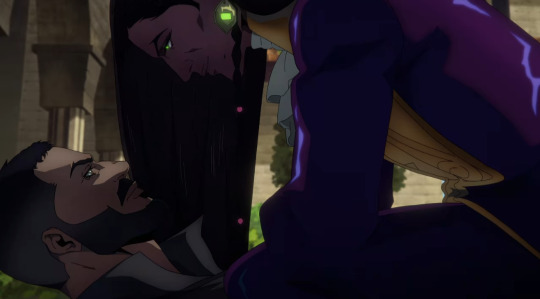
A smaller part of the episode is a homoerotic confrontation between Olrox and the Abbott's right hand, Mizrak (Aaron Neil) Olrox seemingly throwing a wrench into their plans for his own gain, planting a seed in the warrior's mind that Erzsebet will cast them aside when the opportunity arrives.
Maria also introduces Annette to her revolutionary group, but are attacked by night creatures, Edouard among their ranks. One little twist is that Edouard maintains a degree of consciousness. He turns away from Annette, hides his face, and ends up attacking another creature that goes after her. In that regard, I consider his appearance to reflect that the process of the forge was perhaps flawed in some manner. But we have seen creatures display a degree of independence before, and memories of their past life as with FlysEyes.
Whatever the cause, he's carried off with the remaining night creatures, Maria noting that they were heading in the direction of the Abbey.
Episode 4 follows up with Maria and Annette being hell-bent on assaulting the Abbey for answers, although Richter objects to the impulsive nature since they're unsure. Tera instead offers a more subtle approach with an alternate entrance to the cellar. In fact, she knows a little bit too much about the Abbey, something Richter takes notice of.
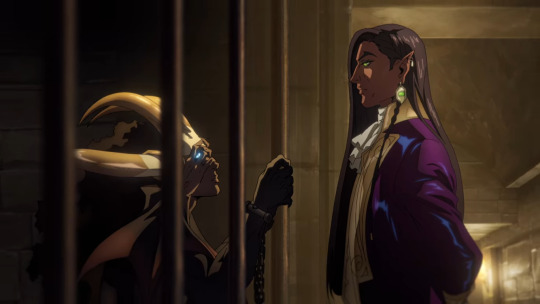
Olrox is also busy getting answers. From an afterglow chat with Mizrak to secretly investigating the demon forge and its workings. He even chats with Edouard while the Abbot is busy in a meeting with Drolta on their uneasy alliance.
Trepidatious though it may be, both see a benefit. Emmanuel wants to purge the revolution for questioning and outright attacking the church. The Vampires want to maintain a ruling class and need a human to forge demons for an army. It's all about the status quo.
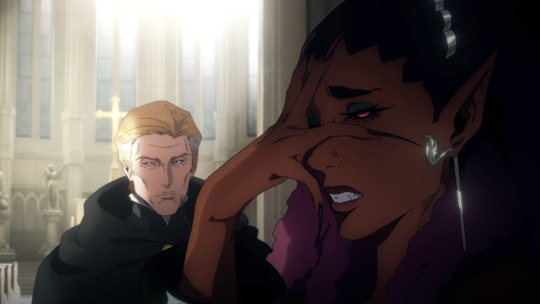
Drolta also has some good character bits here. I wouldn't call her particularly deep as a villain, she never becomes as interesting as Olrox. But she is a fun villain. Which, hey, that's more than I can say for her Bloodlines counterpart who was just a witch.
You can also tell someone had a lot of fun designing all of Drolta's different looks, she has more outfit changes than anyone else and her aesthetic is fucking great.
All that said, Drolta and Emmanuel cross paths with our heroes, and a big chunk of the episode is a massive fight in the cellar. If you've read my previous Castlevania reviews you know I dislike regurgitating what's on screen followed by "done well" But this is a highlight of the season. We're at the midway point, the threads are starting to come together, and we're ramping things up with an amazing battle showcasing everyone's abilities brilliantly. In particular, we see how dangerous Drolta is. All this with a beautiful vocal performance by Edouard.
Amongst all this action are some story morsels; Tera is horrified at Emmanuel for one- although he does stop Drolta from going after Maria. Put a pin in that.
There's also a truly heart-wrenching moment between Annette and Edouard where he begins to remember who she is. And if that wasn't enough, just when we're showing how fucking badass Richter can be with him finally handling night creatures, Olrox makes his presence known. And the utter looks of terror in Richter's eyes upon hearing his voice is so palatable.
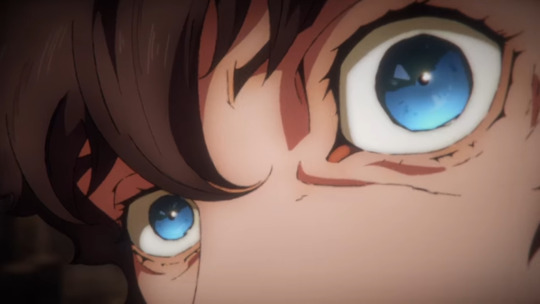
The facial expressions this season are truly wonderful.
Richter tells everyone to get the fuck out and runs for it, not stopping. And what I love is right after everyone has escaped, Olrox acts completely natural toward Drolta, saying he just got off the boat and the messiah is expecting him.
Ep 5 is split into three parts. One follows a frustrated Annette as she heads out and eventually tails Drolta's carriage until she meets up with Olrox. This segment is largely exposition while also trying to further convince Olrox of their cause. There's a lot of back and forth about rising and falling empires, something both Olrox and Drolta have seen their share of since their Aztec and Egypt days, respectively. It boils down to Drolta considering the natural order of things to be of rulers and subjects. The messiah can supposedly offer a permanent empire for Vampires to rule.
After that meeting, and by complete happenstance, Annette ends up running into Vaublanc in the same graveyard. She uses her ability in possibly the most unique manner to trap the slaver in a cage of crosses. And for really no good goddamn reason at all, he gloats about Erzsebet Báthory's plans and her power. How she drank the blood of the Egyptian goddess Sekhmet. Considering she's a solar goddess, all I'm picturing is the time Dracula bit Superman and blew up.
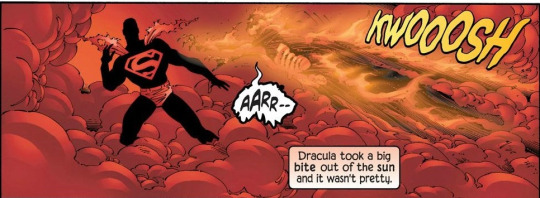
That somehow didn't happen but instead supposedly gave her the ability to block the sun. This ranting goes on until the sun rises and burns the lesser vampire to a crisp.
Meanwhile, Emmanuel shows up at Tera's house. It's a similar case of back and forth, how Emmanuel is clearly engaging in horrible sacrilegious acts but he views it as an end justifies the means sorta way.
I'm getting a little bit ahead of myself here, but this is basically Emmanuel's character for the rest of the show. Becoming increasingly unhinged, but with a touch of self-awareness. His character has this uneasy combination of the deeper he goes, the worse he feels…but he can't stop. You wonder if it will ever be too much. Honestly, it makes for a more interesting human monster compared to the flat 200% evil priests of the previous Castlevania.
Oh, it also gets revealed that he's Maria's father.
Okay, that's not shocking from an audience perspective, it's painfully obvious what with Tera's comments, history, and the fact that there are only two adult blonds in the entire show. But from the Character's POV, it causes a rift between Maria and her mother.
Richter oddly has the least to do in this episode, yet he is perhaps the most interesting. After bolting and having a breakdown, he wanders aimlessly, gets a bandana from some revolutionaries smitten with his looks, and ultimately winds up at a bar. He's too poor for a drink, although an old man pays for a meal.
And this is when things take a surprising turn. A vampire bursts into the bar looking for the old man. Richter reaches for the whip, but the old man has already taken it and quickly slays the vampire with ease.
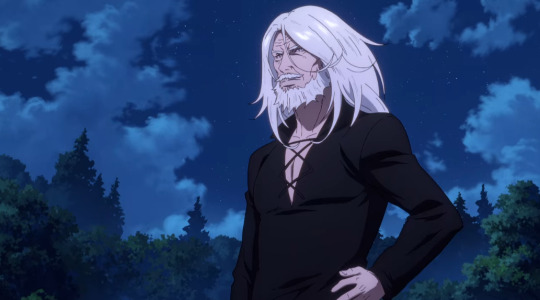
Playing up an old fan theory, this is in fact Richter's Grandfather, Juste (Iain Glen).
This one got me. The moment I saw a long white-haired man I figured it could be, but I was still pleasantly surprised they went there.
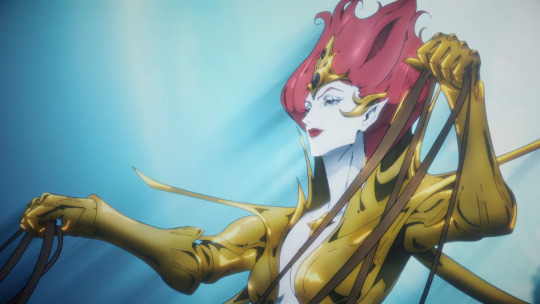
Episode 6 is another dense one, with Erzsabet making her horrifying arrival to France.
Edouard meanwhile begins talking to fellow night creatures, one of whom, Jacques, recalls attending Maria's meetings.
Speaking of, Maria visits Emmanuel in hopes of swaying the Abbott away from his path. I guess you could say she's presenting the choice of what sort of father he wants to be. I admit, it's slightly jarring that Maria would extend this offer in the first place given her utter disdain prior. I guess she wants to give the benefit of the doubt, but she's not exactly had a longing for a father figure as part of her character. Sure, she thought her father was dead until now, but it feels more like something thrown in so Drolta can secretly take notice and set up events for the finale. In fairness, Maria is impulsive, so I guess in that regard it still works. But… yeah I'm still iffy on it as a plot point.
Thankfully, the main core of this episode is much better by being centered on Richter and Juste. We learn why there was such dissonance with his daughter, and why he's kept away from Richter, how he became so broken. Juste once was the most powerful magic user of the Belmonts, the whip was almost secondary to him. But his wife Lydie and his best friend Maxim were both killed by a vampire. After that, he lost his magical touch. He lost hope.
These tales of woe are cut short when elite vampire warriors sent by Drolta assault the duo, chaining Juste and separating Richter from the whip. Richter is restrained and prepared for execution. But something happens to Richter. A burning desire to not only live, but to protect the people he loves. That fire inside him grows and becomes literal.
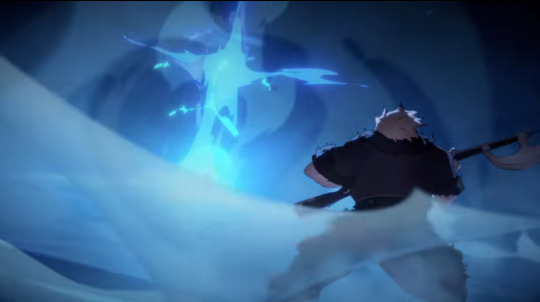
What follows is less of a fight and more pure elegant destruction. Richter burning, freezing, and stabbing all the night fiends. I would also be remiss if I didn't mention this is backed with the one game cover for this season; Divine Bloodlines. Which is just exquisite.
Beyond that, I just love this bit of character. Richter's strength, and consequentially what makes him contrast with Trevor and more directly Juste, is how he channels his trauma into something positive.
However, do not let the above distract from the fact that Olrox gets his own spotlight finally delving into his motivations. After all, he was once part of a great kingdom until the Spanish arrived. Does he see Erzsabet as just another god king which fools have pledged themselves to? Perhaps. We also get some insight into the lover Julia killed. A Mohican man who fought in the Revolutionary War, only to have his home stolen by those same people. The only thing that changed was who the colonizers were.
But lest you think that makes Olrox too sympathetic, the only reason he lost his love is because he was turned into a vampire. Mizrak actually confronts him on this, asking if a choice was even granted. Of course, Olrox was too selfish for that.
Ep 7. Our penultimate episode, unsurprisingly, is mostly set up for the finale. Although a great deal is simply low-key character interactions, like the fallout between Maria with her mother over Emmanuel.
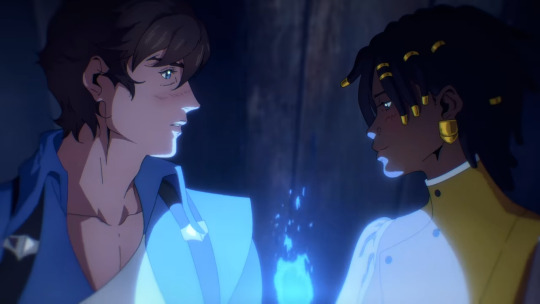
Richter also returns to the trio and has a nice quiet scene with just him and Annette, Richter apologizing for abandoning them and promising to help rescue Edouard. It's really the only scene the two have leaning into there being something between them, Annette admitting she was more worried about him than she wanted. It's rather cute and I love the subtle blush on Annette.
But there's no time to kindle that spark. The four must prepare a full assault on the Abbey.
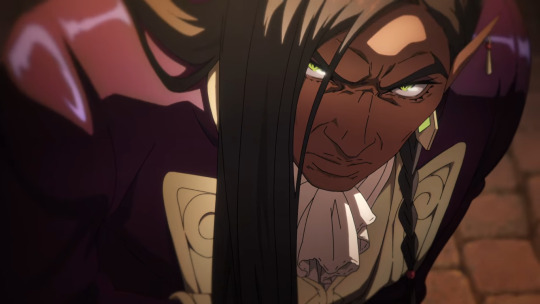
Less low-key is Erzsabet's plans being fully laid out. Olrox is nothing more than a servant to pay Erzabet tribute by conquering the Americas on her behalf. This submission is not something he takes kindly to, but he has little choice.
Speaking of submission, Emmanuel is expected to do just that for the new messiah. A sacrifice of something dear to him; Maria.
As our heroes begin planning their attack on the Abbey, Maria voices concern over what could happen to Emmanuel. But as Tera bluntly puts it: he made his choice.
Before they can continue, they're interrupted by an unlikely source, Olrox, who drops off Emmanuel's infernal tome. While this leads to a whole excursion, the gist is really quite simple; Olrox can't afford to get too involved with this subversion, Erzsabet is far more powerful than any know, and the Demon Forge can only be handled by humans. Whether or not they trust Olrox is irrelevant, this is their best bet at dealing a blow before Erzsabet can build an army.
That night, as Tera reads over the tome, Maria sneaks out and heads for the Abbey, hoping to give her father one last chance to have a change of heart. But it's to no avail, his mind is thoroughly poisoned and Maria is captured, breaking the last straw for Mizrak.
The following day, Tera figures out the solution to dealing with the forge, but it won't be easy. Destruction isn't possible, the only solution is sending it back where it came from; Hell. Annette will be needed to quite literally push the entire machine through a portal. Just as their plan is formulated, Mizrak arrives, warning them that Emmanuel is preparing to kill Maria. As they hurry to the church, the sun is suddenly eclipsed.
Erzsabet, true to the rumors, can call forth an eternal night.
This brings us to the season finale in episode 8. The four arrive in time to save Maria from the crazed holy man. Annette heads down to take care of the forge and also free Edouard, although he prefers staying with the night creatures, two of whom have regained their sentience and even protect Annette.
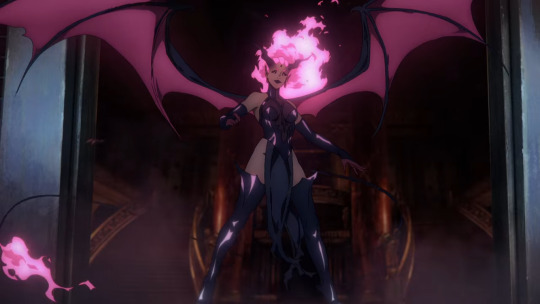
As Tera reads incantations to summon the portal to hell, Drolta and a small squad of vampires arrive at the church for Richter, Maria, and Mizrak to take care of. One thing for sure is that Drolta is a force to be reckoned with. Their previous fight was during the day, but now she's at full strength. Maria is giving it her all, and Richter is no slouch with his new magic. He even gets a few good licks in with his ice whip.
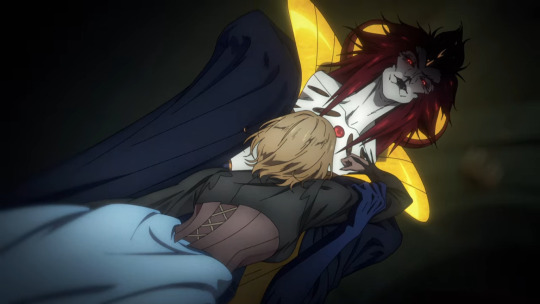
But things change when Erzsabet arrives. She has since transmogrified into a Sekhmet lioness appearance, and she is immensely powerful. None of the attacks launched at her can even make contact. Not Maria's guardians, not the whip, not the elemental magics. She casts everyone aside and heads right for Maria, which causes Tera to lose focus and close the portal.
See, Emmanuel misunderstood. Bathory wasn't looking for a blood sacrifice, she was looking for someone to turn. Tera intervenes and begs to be taken instead of Maria. After all, she's a speaker and would be a powerful minion to have. Bathory accepts.
I want to take a moment and say Tera's fate hits surprisingly hard. She's not the deepest character, we don't spend a great deal of time on her. But she's prominent enough to leave an impact. A flawed individual with the best of intentions and ultimately a good heart. I do want to give mention to Nastassja Kinski's performance, which is her first voice role. She gives Tera this soft-spoken kindly forlorn inflection that perfectly matches her complicated past. And to see that character turned and suddenly become this ravenous beast, feasting like a combination of starving infant and strung-out addict… it's beautifully sad.
This is a show full of contrasts and Tera made a great contrast to Emmanuel, more so than Maria, I think. I don't believe Tera was under any illusions like Emmanuel. Her sacrifice isn't going to spare Maria, but it buys everyone enough time. Conversely, Emmanuel would give up anyone else with the assumption it would be worth it, even as it broke his heart. And make no mistake, his heart is breaking during this moment.
With the situation at its worst, the four make their escape as Drolta and her minions give chase. Drolta closes in on Richter, lunging after him.
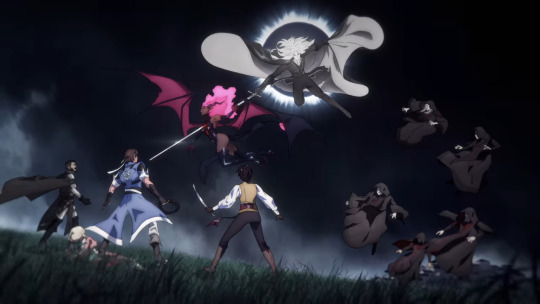
Only to be met by a familiar sword.
Understandably an elite vampire being taken out followed by a guy claiming to be the son of Dracula causes the rest of the vampires to flee. Alucard turns his attention towards Richter, hoping that he isn't too late.
And that is one hell of a season finale. Goddamn.
If it wasn't clear by now. I thoroughly enjoyed this season. There are a few issues I have, mostly small and nitpicky stuff. But things are fairly damn solid and I don't have much major to complain about.
One thing I do see criticized is some of the dialogue being "Cringy." It's not as bad as I had seen made out, but there are undeniably some dorky-ass wince-inducing lines. Some try too hard to be inspiring or funny. One example would be Richter going on a speech as his powers awaken and saying he was "gonna have a witty line… but fuck it." It just doesn't come off as earnest. I get the feeling that it's trying to evoke Ellis' form of vulgarity and irreverent humor- which itself sometimes fell face first. But there's nothing in here even close to "Eat shit and Die. Yes, fuck you." or "See? God Hates me." Nocturne thankfully avoids trying to be too much like its predecessor and is better for it. Although its own quirks occasionally stick out, it's nothing that ruins the moment. Probably the worst it gets was Annette's speech to the revolutionaries which isn't even a paragraph and about as inspirational as Marshmallow fluff is nutritious. Maria's overly enthusiastic reaction only highlights the lame awkwardness. Fred Hamton this was not.
I suppose on a related note, it is worth talking about the themes of the series. The most notable of all these is how it interprets Vampires among the aristocracy, literally feeding on the lower classes. Not an original take by any means, but one that works and is great for the setting. Perhaps the most criticism I can levy towards Nocturne when it dips into the various class systems at play is how little it actually gets to delve into them, despite how constant they are.
It does raise some interesting ideas and points, such as the uprising in Saint-Domingue, or how Olrox's Mohican lover was turned against by the Americans. It presents this idea that there are those that will always see themselves above others and the French Revolutionaries aren't really going to give a shit once all is said and done. A slave is beneath a peasant, an Indian beneath a colonist, a night creature beneath a human, a human beneath a vampire, and so forth. But as prevalent as that is, I don't think the series ever takes full advantage of those elements. The parallels are just that, parallels. Something repeated but never expanded upon in a meaningful way.
Look, I'm in a post-Black Sun world. I realize nothing is going to compete on the totally radical scale by comparison. Still, while Nocturne is far from toothless, it doesn't have as much bite as it could.
I will give credit to Olrox. I think he's the most interesting of the bunch in how these systems affect his compass. Driven away from his homeland by Conquistadors, his lover was driven from his by revolutionaries. Olrox himself is now part of a system of power- and yet he is still subjugated as nothing more than muscle to a more powerful figure within that system… who wants him to colonize.
As for everyone else… Man, this is a weird situation. For Richter, I don't think there's much that hasn't already been covered. I like his character and what they do with him. It's a fairly typical young hero journey, one that just got started in a lot of respects. He overcame is trauma, got his power back, and was met with something far stronger. He has quite a ways to go and more to learn. I think it's safe to say that applies to Maria, too. Perhaps even more so because she lacks a character-focused episode that doesn't center on her family. She was fine overall, but I'm more looking forward to the next season and the fallout of losing her mother to a fate worse than death, how that affects her, the relationships around her, and perhaps channeling it into becoming more powerful.
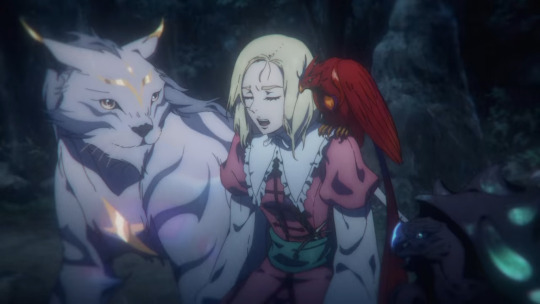
Curiously, Maria is down an animal buddy throughout this entire season. I'm not counting the doves/owls because I'm fairly certain they were considered redundant with huáng. But Shenlong is noticeably absent and I can only assume that's going to be Maria's big upgrade in the next season. I hope the same is true for Richter. As much as I appreciate seeing them get clever with the ice and fire abilities, I want to see things I associate with him specifically. The closest we get is the flame whip and a pseudo grand cross. Have him throw a bible and the page cut like razors or stick like Fulu talismans, 1,000 blades, hydro storm. Make that a part of him getting stronger, going beyond the traditional magic, and perhaps tie that in with some character stuff with Annette as their relationship blossoms. (As an aside. I can't help but think Tera being turned into a vampire is perfect setup to make the whip into a proper vampire killer ala Lament of Innocence.)
To give more credit where it's due, I also appreciate what's done with Annette by incorporating wider cultural elements into the setting, in addition to still being something that's a major part of her background. I'm hoping for more stuff with Annette next season because I feel aside from her origin tale she's easily overshadowed by Richter's journey feeling more full. Plus it's perfect opportunity to set up a family dynamic with the three.
Getting back to the magical angle, I also love that Erzsabet takes on a second form in relation to a God. That's very much in tune with how in the games Dracula could assume a form like Pazuzu. Likewise, Olrox can turn into a giant serpent, which is a nice twist on his lizard form from SOTN while giving some Quetzalcoatl-like qualities related to his own background. Hmm, that's another Sun God like Sekhmet…
But a lot of what I'm talking about here is setting and background stuff around characterization. And also shit I'm expecting/wanting next season because I've already covered most of the characters. Well, that, and as efficient as the story is, it does leave me wanting more. Which, yes, is a great thing. I enjoy these characters and want to spend more time with them. I feel it's at least appropriate enough to leave off where we do.
But there is still a nagging part of me that hates that we have horribly short seasons with this franchise. As wonderful as the writing is at balancing the narrative and characters for a streamlined experience, it's still in the single digits. We only have 8 roughly 25 minute episodes and I struggle to say more than a few unique blurbs about any one character because of that short run.
The plus side is they use every bit of that run time well, it's remarkable how much is done in that time. The downside is "barely scratched the surface" is a phrase I can apply to most of the cast. Richter is truthfully the only one with a proper fulfilling arc that still leaves room for growth. Annette sorta gets a spirit journey about using the full strength of her ancestors and forgiving Richter, but that's kinda it. Maria has some character stuff with her family, but it's not a journey in the same way as the others, despite the personal nature. We're going to have to wait until next season before deep-diving on Maria and Annette. To say nothing of Mizrak who barely has a speaking role.
The more I think about it, the more I wish this was 3-5 episodes longer just to sink those claws in more. It almost feels like a show that is the best case scenario for when you cut out all the fat.
As it stands, I'm still appreciative of what was done. 8 episodes were ordered and they did the best with those restrictions, that much I believe is certain. Maybe it's best to focus on what is rather than what could be, and what we got is still damn good.
Also damn good is the animation this season.
So this is going to be a pretty sort section because I'm limited to 30 photos and I've got 4 other reviews talking about the animation in Castlevania. One thing I have to point out is that Netflix and many others are calling this an anime, despite the fact that outside Japan the term typically refers to animation which is at the very least produced by a Japanese studio. We won't get into the semantics of how that applies if the actual animating is outsourced to South Korea (Which Studio DR Movie is) Or the nuances of how styles have intermingled for decades.
Honestly, I don't really care all that much. I'm just pointing it out because I find it hilarious that a show partly handled by a studio based in Austin, TX gets slapped with the Anime label because, and let's be real here, they're too insecure to call it a cartoon or animation outright. That's the only reason. Amazon does the same damn thing with Invincible, which is just embarrassing in my eyes.
If the HBO Spawn was made today they'd be trying to do the same shit with that… especially since that was partially handled by Studio Madhouse… who outsources to DR Movie.
Anyway, we've got yet another change up this season with animation moving from Tiger Animation in Season 4 to the renowned DR Movie. Chances are you've seen their work somewhere before, as they're pretty big in both the Japanese anime and Western animation scene. They've done everything from the in-between shots on JJBA Diamond is Unbreakable, to additional work on the 2010 Young Justice series.
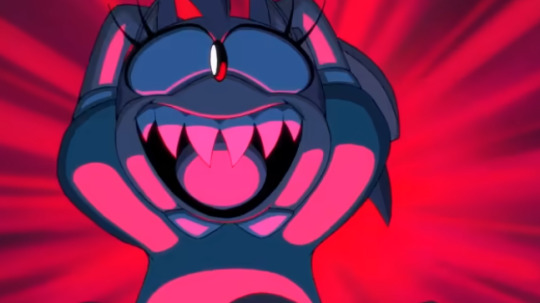
Of course, that's not to say they handled all of this. After all, Powerhouse Animation has been at this since the first season in 2017, and are damn impressive in their own right. If you've seen the Sonic Frontiers and Superstars animations, that was them.
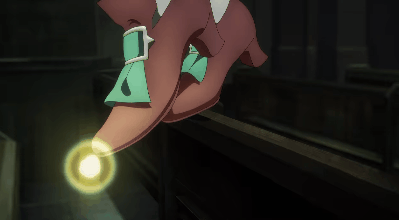
While the gap between this and Season 4 isn't massive, the uptick is still very noticeable. Fights in particular stand out more with a strong sense of choreography to the battles. There's a good use of the environment with impactful kinetic energy. Shading and lighting are probably the best it's been, and at no point was there a glaring instance of what could be perceived as "corner-cutting." It's frankly gorgeous and perhaps the best so far.
What I have a harder time commenting on is the music, and man, I always feel trepidatious talking about Music in the animated series. Comparisons to the games are inevitable, and those have some of the most rockin' iconic beats of any game series. The show typically only has one game track represented per season, if that. Yet I also feel that's disingenuous to Trevor Morris and (this season) Trey Toy, who do great work. Yet often times it is very atmospheric and more subtle, which I have a hard time conveying that, aside from asking if you like Castlevania IV's approach. What I can say, aside from the obvious choice of Bloonelines, is that Lamento della Ninfa is the standout track this season. It's used a couple of times, mostly in the Abbey, and it is a truly beautiful piece that complements the battles yet is still a great track divorced from the context of the scene at play.
I also feel bad saying that because it, like bloodlines, is a preexisting track. In this case a Claudio Monteverdi composition.
Since we're on the subject of vocals, I might as well talk about the voice acting. It's good. I mean what the fuck do you expect? We're on a sequel to a 4 season show, of course, they're going to get that right. I will say it's surprising that not a lot of the cast have voice-acting credits prior to this. Some have one or two, for others this is their first VA role, and they all do a damn fine job.
Less surprising is that Zahn McClarnon is one of the stand-out performance to me. He is the most experienced of anyone in the cast, and ironically it's the role showing the least variety. But I would say it's the most complicated because Olrox has a very subdued, practically emotionless delivery. To impart that sense of control over oneself without being stereotypically monotone is remarkably difficult for a lot of performers. I can hear Olrox and immediately pick up he's weary from all the shit he's seen. Every now and then you'll get something dry and cheeky, or a cold threatening aura peeking through the unnatural calm.
The other standout is Sydney James Harcourt. As far as I'm aware, this is his first VA role. He is primarily a musical performer on and off Broadway. And yes, that means when Edouard sings, it's still Harcourt. So that amazing rendition of Lamento della Ninfa is him.
Final Thoughts.
Castlevania Nocturne quelled most of my fears about the series continuing on, and in some areas showed itself to be far more nuanced and interesting than its fore bearer. There are still critiques I have with the show- it seems an absurdly short season is a reoccurring issue with this franchise. But I can't deny that few shows can do so much in so little. I've seen 43 episode series do less with their characters, so make of that what you will.
Whatever issues I have with the episode number, I'd rather them set up and wait than try to tackle too much in a season that clearly doesn't have the time. My only real concern going forward is Netflix's abysmal practices fucking the show over. Ya know, is it going to take a third season to get some characters a satisfactory amount of development?
Regardless, I can say that Nocturne's first season feels refined, and frankly more mature. It never goes above the means given to it, and despite some stumbles, it's not overly ambitious or clunky. Nocturne knows exactly what it wants and gets to it in the shortest amount of time. If season 2 can continue that trend remains to be seen.
I'm at least confident the series is in good hands.
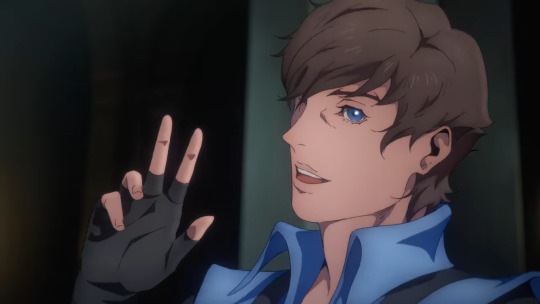
As always, thanks for reading, and reblogs are always welcome.
You can find me on Bluesky @kamenstranger.bsky.social
I have a Ko-fi if you'd like to throw a dollar at me.
Happy Halloween!
12 notes
·
View notes
Text
fun fact!! it turns out that now when u make a new blog, tumblr forces you to follow 3-4 people before you can change your icon or modify your blog in any way!! this, of course, means that, yes, some of the "potential bots" many of us have been automatically blocking could have possibly been genuine new users who were only just seconds in to having an account!!! tumblr is literally screwing new users over!!!!
172K notes
·
View notes


